It is
said that power corrupts, but actually it
is more true that power attracts the
corruptible. The
sane are usually attracted by other things than
power.
-
David Brin
|
|
|
The Conclusion of the Cancer
Diaries
|
Part Nine:
Corruption
Written by
Rick Archer
November 2014
The Cancer Diaries
began fourteen months ago in July 2013. That is when my friend "Mr. Skeptic"
insinuated that I was an idiot for supporting mainstream cancer
research.
At first
I thought to dismiss him out of hand, but he was so adamant that I
had to pause and wonder. I had too much respect for him to
condemn with at least some investigation.
So I
decided to take a look. That
started me down a long and winding road. Along the way, I
learned that over the past century people in the Medical Community
have gone to great lengths to suppress several promising 'natural'
cures for cancer.
That has
led me to ask why any health professional in their right mind would
deliberately sabotage a cure for cancer.
And I got my answer...
money. It is definitely in the economic interests of certain powerful
people to maintain the cancer status quo.
|
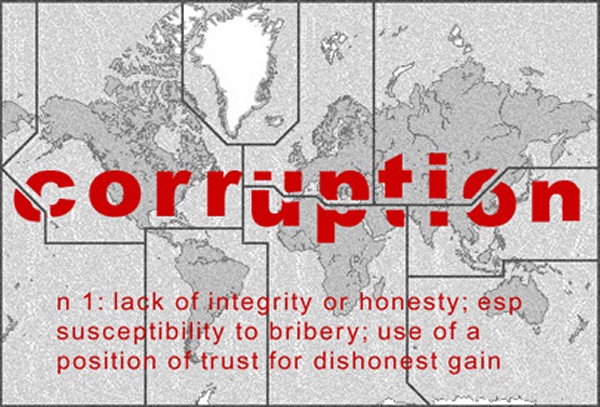 |
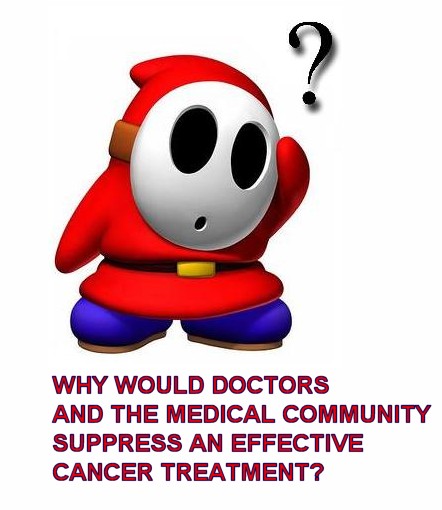 |
WHO ARE WE
TO BLAME?
Given
that I was raised to believe that doctors are people to be trusted
above all others, I found it disconcerting to think they were part
of the treachery.
It took
me a while, but I eventually realized that the problem lies not with all
doctors but rather with "some doctors". I suspect many doctors
are just as appalled by the situation as I am. They probably feel
just as helpless as I do at the overwhelming obstacles to change the
widespread corruption in medicine.
The problem
isn't just "greedy doctors". It lies with hospitals that are desperate to fill beds. It lies with the
Pharmaceutical industry desperate to push pills. Health Insurance
has a vested interest in
this game as well.
I have
learned that the more wealth and power is
vested in any particular industry or profession, the more ruthlessly
it
will protect itself from threats.
Every industry and
profession has an infrastructure designed to protect itself from
competition. How far they take their defensive strategies, and how
far they dare take them, is dependent on how powerful that industry
or profession is.
The more concentrated that
wealth and power, the more likely it becomes that
ruthless activities will be employed
to keep the competition at bay.
When I
started my search, I naively thought these corrupt practices were
limited to cancer research. Now I know better. This
practice not only exists in the world of medicine, it extends
throughout banking, energy, politics, the pharmaceutical drug
industry, the health insurance industry, and the auto industry.
|
|
|
|
"It is time you learned the facts of life. You
see, there are really only two kinds of people
in the world, the eaters and the eaten. You just
have to make up your mind which group you're
going to be in.
When you have the power,
you don't have to tell the truth. That's a rule
that's been working in this world for
generations. And there are a great many
people who don't tell the truth when they are in
power in administrative positions."
- - Dr. Dean Burk, NCI biochemist
and cancer researcher
|
The Nature of
Corruption
History
is lined with examples of people who will
deliberately lie to the public to protect their own
interests.
• We know full
well that corruption exists in our
government. My article on the
Twisted Golden Rule (Chapter
Eight) made this perfectly
clear.
• We know that corruption exists
on Wall Street. Bernard Madoff comes to mind
as a prime example as well as
reports of widespread insider
trading.
• The stories
of
Wade Frazier concerning his
experiences in the Savings and Loan
industry leave little doubt of
unbelievable corruption in this
area.
• We have strong evidence that corruption exists
the American business world. The
pharmaceutical industry, the
chemical companies, and the tobacco
industry are prime examples of
businesses that appear to have no
conscience. Enron
falls into the same category of
immoral behavior.
However,
it still remains difficult to accept that corruption exists in
medicine. It jars the mind to think that a
profession dedicated to saving mankind contains
people who will deliberately promote their own
selfish
interests over that of their suffering patients.
|
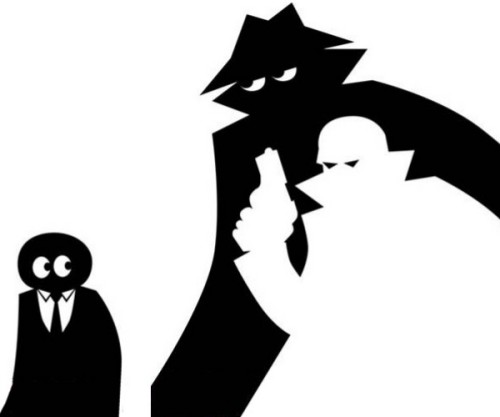 |
|
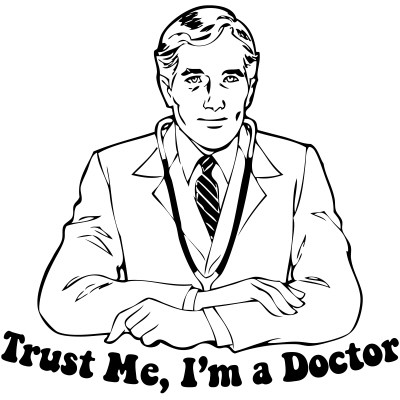 |
But
there seem to be little doubt that this
violation of the public's trust can
happen.
One need
look no further than the story of the
Memorial Sloan
Kettering (MSK) executives who deliberately
discredited the value of Laetrile even though they knew
full well that their leading researcher was coming
up with strong evidence in support of the drug's
effectiveness.
(Chapter
Two: The Medical Conspiracy)
Since the interests of the entire pharmaceutical drug
industry depended on the continued use of synthetic
drugs in the fight against cancer, the
executives at MSK weren't about to bite the hand
that fed them.
If Laetrile had to be
sacrificed in the sacred pursuit of continued drug profits, so
be it.
|
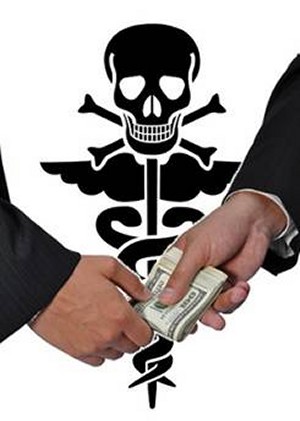 |
"I
am not going to give up my career to die on the
barricades of Laetrile."
-
- Lewis Thomas, President of MSK (and cancer victim)
|
|
Assuming
one has read my previous eight chapters, then the
reader is well aware I have
presented one anecdotal situation after another that suggests there are powerful people who are so
ruthless they would do anything to suppress a
natural cure for cancer.
As a revenue
producer, cancer is one of the largest industries in
this country. Doctors, hospitals, and the
pharmaceutical industry are all deeply dependent on
the cancer cash flow.
One need only multiply the
number of victims per year, which runs around one
million, by the average cost of treatment — tens and
more often hundreds of thousands of dollars — to
sense the profound economic dependence of the
medical and pharmaceutical industries on the
continued supply of patients
who need cancer treatment.
One
would assume that the people running businesses
that benefit economically from the current status of
cancer treatment in America would be noble enough to
step aside if a legitimate cure for cancer came
along for humanitarians reasons.
But I no
longer believe that will happen voluntarily.
This industry has to implode from within like
tobacco did.
My opinion of the people
in the pharmaceutical industry has sunk so low that
I think they would do anything to cling to their
wealth.
I compare them to the tobacco people
who knowingly poisoned our entire country and didn't
have a shred of conscience about doing so. If
tobacco made people sick, hey, it's their own fault
for smoking the stuff.
It may be difficult to comprehend this, but so many
people have become dependent on cancer income that
they will do anything to hang onto their failing
therapies.
|
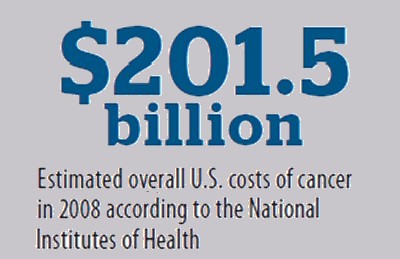
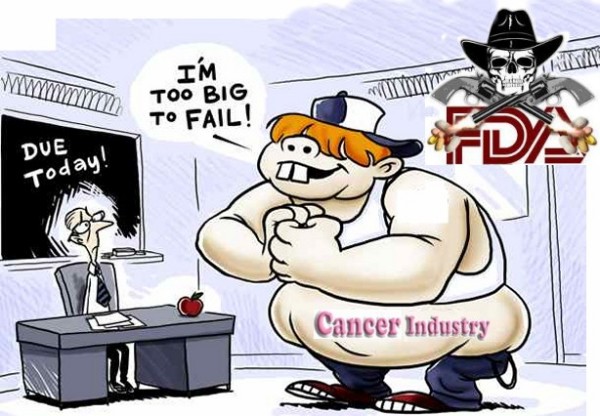 |
Meanwhile people die right and
left.
It is
impossible to judge the magnitude of the guilt
of the people who have suppressed the natural cures.
Fortunately for them, they will never be held
accountable. That is because they murdered the main witness
- the cures themselves. This means we will
never know for sure whether those alternative
therapies actually worked or not.
Isn't that the essence
of the American model of competition?
It's a dog eat dog world; let's just kill off the
competition. Isn't that the American Way?
Only one problem - by killing potential cures for
cancer, they killed off a lot of American
people in the process. That is not an
easy fact to overlook.
We don't like to think about the victims,
but anyone who has seen the pain and the
suffering caused by cancer would have a hard
time accepting that legitimate cures for
cancer may have been cast by the wayside.
Meanwhile we are stuck with "mainstream
medicine" - chemo, cut, radiation.
Aren't we lucky? Everyone seems to die from cancer
using mainstream medicine.
The question is only 'sooner or later'.
At this point, any family bankrupted by the
corrupt practices of the doctors,
hospitals, and health insurance companies
has nothing to show for the loss of their
loved one except overwhelming bills and
the misery of watching someone they cared
about suffer horribly during the prolonged
march to death.
If more people understood what was really
going on here, this situation would be a national
scandal.
|
Who Are the
Guilty Ones?
I know for an
absolute stone cold fact that at least a dozen very effective
cancer treatments have been suppressed by mainstream medicine in
the last 70 some years.
-
Gavin Phillips
[
source ]
|
|
As we approach the end of
our long and winding road, a brief retrace of our earlier stops
might be in order. I began this search
because back in June 2012 a friend of mine I call Mr. Skeptic told me I was an idiot for
supporting mainstream cancer research. He suggested I watch a
video titled Cancer-The
Forbidden Cures. That was where my path began.
To my dismay, the video
did a brilliant job making the case that several potential cures for
cancer have been eradicated by mysterious forces over the past
century.
Now I was worried that
my friend was right. So I investigated three of the stories
covered in the video - Rene Caisse, Harry Hoxsey, and Max Gerson.
The story about Max Gerson upset me the most. My research showed that
Max Gerson was most likely a medical genius. But Gerson was
shut down by a thug named Morris Fishbein and certain politicians in
Washington.
I was shocked to
discover that Morris Fishbein had also destroyed a towering medical
genius named Royal Rife. So now I took the time to study
Fishbein as well. I
learned that this sociopath made an entire career out of destroying
every possible alternative cure for cancer that came across his
plate.
|
 |
While studying
Fishbein, I
discovered two more sabotage efforts.
The suppression of
Laetrile in the Seventies and the Salem witch trials of
Stanislaw Burzynski in the
Nineties were nothing short of scandalous.
That was the last straw. Now I was convinced that
something was deeply amiss in our medical industry.
I have a principle
that I have lived by my entire life... The Three Strikes Rule.
If it happens once,
it is an incident.
If it happens twice, it is a coincidence.
If it happens three time, it is a pattern.
And if it happens
SIX TIMES, it is a conspiracy.
My first question
was to ask if it was true that these alternative cures might have had
potential.
Truthfully, all we
have is anecdotal evidence that these cures had potential, but
certainly no rigorous scientific certainty.
What we do have is a
messy trail of circumstantial evidence that points to deliberate
sabotage. Although I will never have a way to know if
those cures "really worked", after reading the stories
of disruption involved
in six different stories - Essiac, Hoxsey, Gerson, Rife,
Laetrile, and Burzynski - there was no doubt left in my mind
that shadowy figures were determined to prevent these therapies from
succeeding. Each person met such intense interference with
their work that I was left flabbergasted.
Now I was forced to
ask myself this question:
Why would anyone in their right
mind deliberately suppress a potential cure for cancer?
The more I
concentrated on this question, the more I realized that each
time "The Authorities" had been used to destroy them. Time
and time again people representing the government were involved
in stopping people who seemed to be well-minded cancer
researchers.
So now I asked a
second question:
Why was our government so profoundly
involved in the harassment of these individuals?
That is when the
answer finally dawned on me. Much of our health industry's
problems could be traced directly to our politicians (read:
The Twisted Golden Rule). My mistake was that I had been looking at the
trees, not the forest. When I took a step back, I realized
that our government is involved in all sorts of questionable
activities - calling off regulation in the banking industry,
supporting fossil fuels over alternative energy, and
systematically ruining our health industry with its bizarre
insistence on an outmoded system.
So that led me to my
third question, easily the most important of them all:
How on earth will we ever break this
unholy alliance between the cancer industry and the various
government officials who protect their interests?
Interesting enough,
it may be possible. It has been done once before.
Let's learn what happened.
|
| |
The History of the
Tobacco Industry
|
Feel free to disagree with me if
you like, but in my opinion the U.S. Tobacco Industry has
always felt like legalized homicide.
Dating back to
the Sixties, the American public was first told of a direct
link between smoking and cancer. In the years since,
this message has been repeated time and again. At this
point, it has been established beyond the shadow of a doubt
that smoking carries with it a high risk of cancer.
And yet some
people keep smoking anyway. Hard to believe, isn't it?
The main reason
'smoking' persists as a problem is the tobacco industry's
refusal to throw in the towel. This industry continues
to use every means at its disposal to find new victims for
its products. I understand that every person reading
my article already knows what I am talking about, but let's
go ahead and cover the details anyway.
A
government report states that millions of Americans
have health problems caused by smoking.
Smoking harms
nearly every organ of the body and diminishes a person’s
overall health. Smoking is a leading cause of cancer
and death from cancer. It causes cancers of the lung,
esophagus, larynx, mouth, throat, kidney, bladder, pancreas,
stomach, and cervix, as well as acute myeloid leukemia.
Smoking also causes heart disease, stroke, aortic aneurysm
(a balloon-like bulge in an artery in the chest), chronic
obstructive pulmonary disease (COPD) (chronic bronchitis and
emphysema), asthma, hip fractures, and cataracts. Smokers
are at higher risk of developing pneumonia and other airway
infections.
Knowing full
well the dangers of smoking, nevertheless the tobacco industry
desperately continues to hook the young and the old on
addictive
smoking.
According to
a Center for Disease Control
fact sheet, in 2011 the cigarette companies
spent approximately $23 million per day on marketing tobacco
products here in the U.S.
The CDC says the tobacco companies continue to directly
target youth and young adults. The report states there
is sufficient evidence to conclude that there is a causal
relationship between tobacco company advertising and
promotion and the initiation and progression of tobacco use
among youth people.
There is
scientific evidence that shows:
•
Adolescents are exposed to cigarette advertising.
• They find the ads appealing.
• The ads make smoking appear to be a desirable activity
linked to popularity.
• The ads increase adolescents' desire to smoke.
Adult Men are
targeted by ads linking 'virility' and 'smoking'.
Think "Marlboro Man".
Women have long
been targeted by the tobacco industry all the way back to
the 1920s and the
Torches of Freedom ad campaign. Tobacco companies
have long produced brands specifically for women such as
'Virginia Slims'. Marketing toward women is dominated
by themes of social desirability and independence, which are
conveyed by advertisements featuring slim, attractive, and
athletic models.
The
advertisement and promotion of certain tobacco products
appear to be targeted to members of racial/minority
communities.
• Marketing
to Hispanics and American Indians/Alaska Natives has
included advertising and promotion of cigarette brands
with names such as Rio, Dorado, and American Spirit.
• The tobacco industry has targeted African American
communities in its advertisements and promotional
efforts for menthol cigarettes (e.g., campaigns that use
urban culture and language to promote menthol
cigarettes, tobacco-sponsored hip-hop bar nights with
samples of specialty menthol cigarettes, targeted
direct-mail promotions).
Why people
continue to smoke is one of the great mysteries of our
society. People know smoking is dangerous, but they do
it anyway. I tip my hat to the powers of advertising.
Anything that can get people to voluntarily shorten their
life is powerful stuff indeed.
|
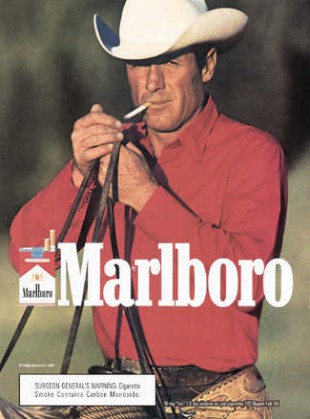
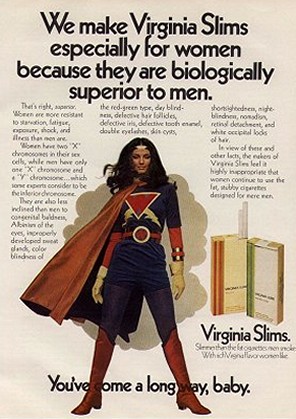
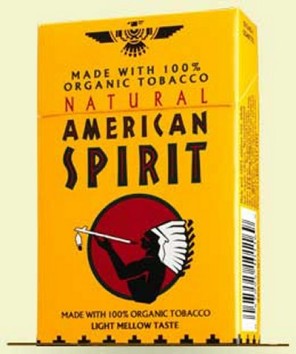 |
Big Tobacco Played
Dirty and Millions Died
|
A 2009
study made by Kelly Brownell of Yale and Kenneth
Warner of Michigan told the following story:
In December
1953, the CEOs of the major tobacco companies met
secretly in New York City. Their purpose was to counter
the damage from studies linking smoking to lung cancer.
A year
earlier Reader’s Digest — then the public’s
leading source of medical information— had printed an
article entitled “Cancer by the Carton” (Norr 1952)
After it
appeared, cigarette sales plummeted for two years, the
first such decline of the century except during the
Great Depression.
Working closely with John Hill, the founder of the
public relations giant Hill & Knowlton, the industry
created “A Frank Statement to Cigarette Smokers”.
They
paid to have it published in 448 newspapers on January
4, 1954.
To give the industry a human face, the
statement included the signatures of the nation’s top
tobacco executives and assured Americans that “we accept
an interest in people’s health as a basic
responsibility, paramount to every other consideration
in our business.”
Furthermore,
they promised that “we always have and always will
cooperate closely with those whose task it is to
safeguard the public’s health” (Tobacco Industry
Research Committee 1954).
The “Frank Statement” was a charade, the first step in a
concerted, half-century-long campaign to mislead
Americans about the catastrophic effects of smoking and
to avoid public policy that might damage sales.
Unearthed later, industry documents showed the repeated
duplicity of its executives. Everything was at stake.
The industry wanted desperately to prevent, or at least
delay, shifts in public opinion that would permit a
barrage of legislative, regulatory, and legal actions
that would erode sales and profits.
The
1954 “Frank Statement to Cigarette
Smokers” became Big Tobacco's
counter-attack to the Reader's Digest article. The tobacco industry had a
playbook that emphasized
using "Authorities" to reassure the
public. These authorities stated that
the public’s health was the industry’s concern above all
others and promised a variety of good-faith changes.
•
They
paid scientists who delivered research that
instilled doubt.
•
They
lined up physicians and celebrities who told the
American public there was no harm in smoking.
•
They
criticized the
“junk” science that found harms associated with
smoking.
•
They
lobbied with massive resources to stifle
government action.
•
They
denied the addictive
nature of their products.
•
They increased
their marketing to children.
What followed were decades of
deceit and actions that cost millions of lives.
This half century of tobacco
industry deception had tragic consequences.
Since the “Frank Statement,”
approximately 16 million Americans have died from
smoking, and millions more have suffered from
debilitating diseases ranging from emphysema to heart
disease. Had the industry come clean in 1954—matching
deeds with promises—many of these deaths would almost
certainly have been prevented. No one knows how many.
Perhaps 3 million. Maybe 5 million. Maybe 7 million—just
in the United States alone.
An honest approach by industry
might have saved more lives than any public health
measure taken during the past fifty years.
Furthermore, if industry had
made good faith efforts globally, rather than exploit
and addict the developing world, the benefits could have
been stunning.
|
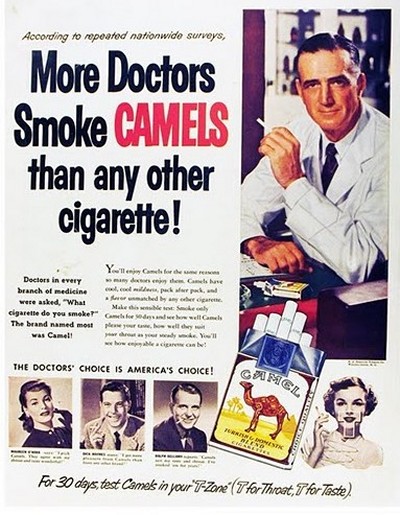
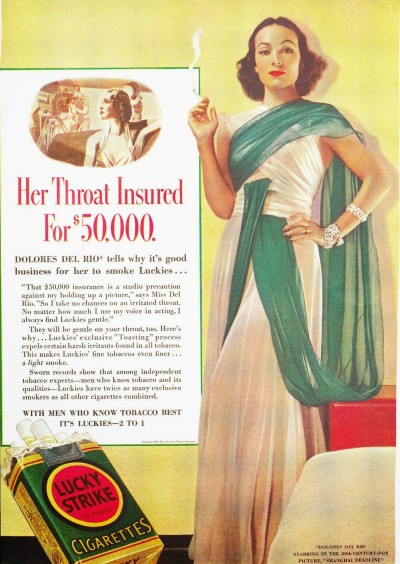
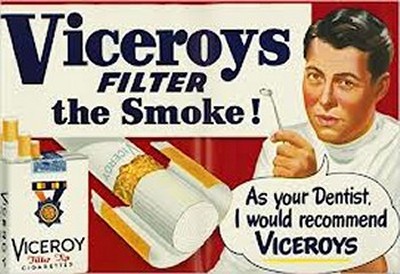 |
Invulnerable! Big Tobacco
Wins Lawsuit after Lawsuit
|
According to
Wikipedia, in September 1950, an article was
published in the British Medical Journal linking
smoking to lung cancer and heart disease. In 1954 the
British Doctors Study confirmed the suggestion, based on
which the government issued advice that smoking and lung
cancer rates were related. In 1964 the United
States Surgeon General's Report on Smoking and Health
likewise began suggesting the relationship between smoking
and cancer.
These studies
emboldened cigarette smokers stricken with disease to sue
the tobacco companies.
By the mid-1950s,
individuals in the United States began to sue the companies
responsible for manufacturing and marketing cigarettes for
damages related to the effects of smoking. These
people got absolutely nowhere.
The tobacco
industry has historically been largely successful in this
litigation process, with the vast majority of cases being won by
the industry (source).
During the first
42 years of tobacco litigation (between 1954 and 1995) the
industry maintained a clean record in litigation.
This success was largely due to hardball legal tactics.
For example, an R.J. Reynolds Tobacco Company internal memo
stated:
"The way we
won these cases, to paraphrase General Patton, is not by
spending all of Reynolds' money, but by making the other
son of a bitch spend all of his."
In the forty
years through 1996, over 800 private claims were brought
against tobacco companies in state courts across the
country. The individuals asserted claims for negligent
manufacture, negligent advertising, fraud, and violation of
various state consumer protection statutes.
The tobacco
companies enjoyed great success in these lawsuits. Only two
plaintiffs ever prevailed, and both of those decisions were
reversed on appeal. As scientific evidence mounted in
the 1980s, tobacco companies claimed contributory negligence
as the adverse health effects were previously unknown or
lacked substantial credibility.
Thanks to its
powerful army of lawyers, the tobacco industry seemed
invulnerable.
And then
in 1995
something happened...
Starting in
1995, the good guys began to win some of the lawsuits. Between 1995 and
2005 only 59% of cases were won by the tobacco industry
either outright or on appeal in the US.
In more recent
years, Tobacco has been pinned on its heels. At this point,
the continued success of the industry's efforts to win
future
cases is questionable. In Florida, for example, the industry
has lost 77 of the 116 “Engle progeny” cases that have gone
to trial. The U.S. Supreme Court has also denied the
industry's major grounds for appeal of Engle cases.
Are you curious
what happened in 1995 to turn the tide? Let's find
out.
|
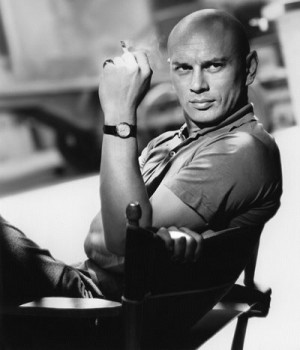
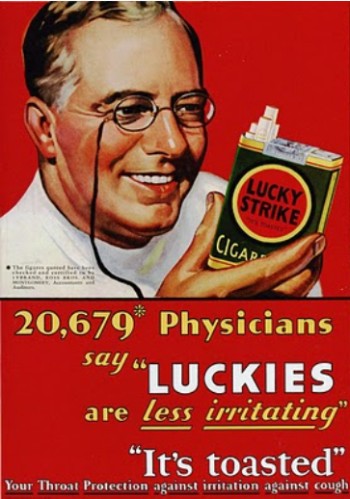 |
Jeff
Wigand - The Man Who
Knew Too Much
|
Do you have heroes? I have one huge hero.
His name is
Jeffrey Wigand.
It took the
bravery of this man to break the stranglehold of the tobacco
industry.
Jeff Wigand
is the person who, in my opinion,
single-handedly nailed the stake into the heart of the
Tobacco Industry. It
was Wigand's brave
actions in the face of death threats,
lawsuits and threats of
imprisonment
that brought the Evil Empire to its knees.
Stop and think about
it: More people have died trying to be “Kool” and “Marlboro
Tough” than Hitler ever killed. Mind
you,
these deaths were rarely very pretty.
And yet no one could
stop Big Tobacco.
|
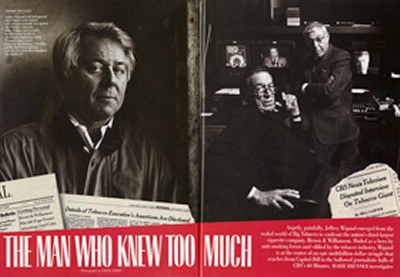 |
But then Jeff Wigand stepped forward
and changed everything.
So who is Jeffrey Wigand??
Following a
25-year career in health care at companies like Pfizer
and Union Carbide,
in December 1988
Dr. Jeffrey Wigand
became the head of research and
development at the Brown & Williamson Tobacco Corporation,
the country's third-largest tobacco company
At the time, Wigand had been
specifically recruited by a
headhunter to join B&W to develop a safer cigarette.
Wigand's initial assignment was to develop a
new, healthier cigarette to put into a competitive market.
Wigand was initially impressed by B&W's seeming commitment
to improve the safety of their products. His department budget was more than $30 million and he
oversaw a staff of 243 scientists and assistants.
However, after just one
year, the program was
mysteriously scrapped. When
Wigand was assigned to other projects, he started to
become suspicious. Over the
next two years, Wigand
learned how the company carefully
engineered its products to make them more
appealing and more addictive by
using additives that
it knew posed serious health risks.
Wigand also observed that his company always denied
doing just that.
Wigand dug deeper. He
came across internal memos that suggested as far
back as the 1960s documents were beginning to claim
that cigarettes were addictive and caused cancer.
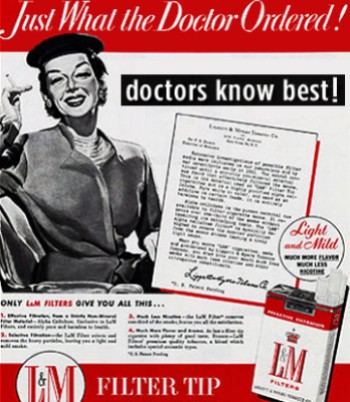 |
These memos used a type of
code language. For example, "increased
biological activity" was tobacco-patter code for cancer and
other diseases.
Wigand discovered that notes were not allowed at certain
meetings. This was to protect confidentiality when status reports
concerning medical findings
were being discussed.
Wigand also learned that the litigation department had a budget in the
millions to keep any case from proving that a smoker was
damaged from the use of the product.
Wigand was incredulous at
these practices.
He had never
seen such corporate duplicity.
|
 |
Finally Wigand decided to speak up.
Exasperated and disillusioned,
in late 1992 Wigand
wrote a sharply worded memo to his
boss, then-CEO Thomas E. Sandefur.
In his letter, Wigand objected to the
use of coumarin in cigarettes. Wigand pointed
out B&W internal
findings that showed coumarin was proven to cause
cancer in rats and mice.
Wigand
got nowhere. He was told that the removal of the tasty,
addictive coumarin would impact sales.
Wigand was in shock. He could not
comprehend why his
attempts to suggest how to make
a safer cigarettes were completely squashed.
Why had they even bothered to
hire him?
Now his anger began to intensify. Wigand
concentrated his research on the properties of these
dangerous additives.
During this time, Wigand was being
watched closely. That internal memo had seriously alarmed B&W
executives. Once Wigand showed his
hand, the higher-ups suspected they had a renegade on their
hands. Now that he was on their radar, Wigand's every
move was carefully scrutinized. As the B&W personnel closed ranks, Wigand soon learned
he could trust no one.
It was too late. Once Wigand had become a marked
man within company, it was only a matter of time. In 1991, his evaluation at work
read that he had "a difficulty in communication."
The evaluation stated Wigand was
becoming a problem with his questions and criticism of
company practices.
The tension mounted and things went from bad to worse.
On 24 March 1993,
citing that
evaluation ("difficulty in communication"), CEO Sandefur
fired Wigand.
Wigand was quickly escorted from the
building. His diary and all his research papers were
confiscated.
Now Wigand faced a serious problem.
His daughter suffered from spina bifida, a serious spine
deformity that required constant monitoring on a near-daily
basis. Wigand desperately
needed to hang onto his insurance coverage.
Brown & Williamson
knew
they had him right where they wanted him. In order to
get his severance benefits, Wigand had no choice but to sign a powerful
confidentiality agreement that made him promise he would not divulge company
policy.
As always, the tobacco people knew how
to buy silence. Over the past century, they had
learned every trick in the book on how to enforce
confidentiality.
After being fired by B&W, Wigand remained optimistic for some time.
But he was surprised
not to be hired immediately by another corporation. As
his bills mounted, now
he began to worry. He reportedly groused about his severance
package to a friend at B&W. Big mistake. The
'friend' turned around and repeated
Wigand's remarks to Sandefur, his former boss.
After his departure, Wigand suspected
that B&W had continued to keep a close eye on him.
Wigand was correct. Behind the scenes, B&W had become aware that Wigand had been
called to testify as part of a 1993 U.S. Justice Department
investigation into Philip Morris' "fire safe" cigarette
program.
Six months after his dismissal, B&W
sued Wigand for breach of contract. They suspended his
health insurance and severance benefits. Based on what
the 'friend' had reported, they
contended that Wigand had violated his confidentiality pledge by
discussing the terms of his severance with another company
executive.
According to the suit, his medical
benefits would be taken from him, a move that would leave
his crippled daughter vulnerable.
Now B&W tightened their hold by insisting that Wigand sign a
even tougher agreement of nondisclosure.
Brown and Williamson was absolutely
determined to shut Wigand up once and for all. Wigand
felt trapped, and he did not know what to do. But
ultimately Wigand had little choice. He reluctantly signed an
onerous, lifelong confidentiality agreement so stringent
that he could be in violation if he discussed even the
slightest detail about
the corporation.
However, this display of corporate
hardball would subsequently rebound against them.
Wigand would later say:
“If Brown & Williamson had just left
me alone, I probably would have gotten a new job and moved
on,”
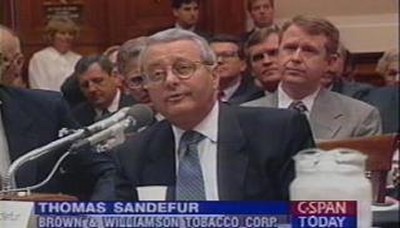 |
Soon
after this came a turning point. In April
1994, television made Thomas Sandefur a national
figure. Sandefur sat at a Congressional
conference table with the chairmen of six other
major tobacco companies in hearings before a House
subcommittee.
"I believe nicotine is not addictive," Sandefur
testified.
Sandefur
consistently maintained that position, saying, "I am
entitled to express that view, even though it may
differ from the opinions of others."
Sandefur
did
acknowledge that his company did control nicotine
levels in cigarettes, but added it was only to
maintain the cigarettes' taste.
|
After
Sandefur's testimony, Representative Henry Waxman,
(D-California), contended that Sandefur may
have "knowingly deceived" Congress about the dangers
of tobacco.
However, no tobacco executives who
testified were charged with perjury.
The seven
CEOs would have gotten off scot-free except for one
person - Wigand.
Jeff Wigand was seething mad at what he
saw on TV.
To him,
Thomas Sandefur was lying through
his teeth.
Wigand
was not only fed up with being pushed around, he was
having a difficult time living with his conscience.
|
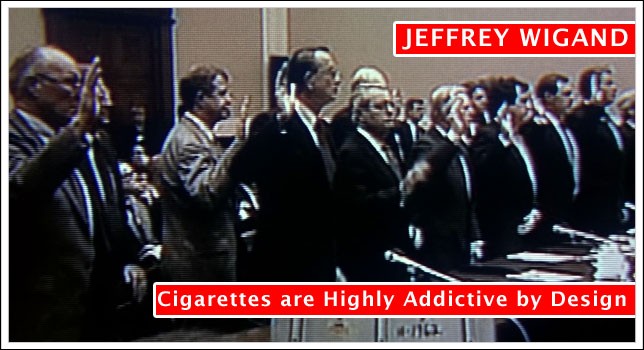 |
Wigand could not believe B&W knew
full well their cigarettes caused cancer, but did nothing to
solve the problem. Instead their total focus was on
keeping their dirty secret to themselves.
It was
at this point that Wigand began toying with the idea
of going public with what he knew to be the truth.
By coincidence, Lowell Bergman, a producer
on 60 Minutes, had contacted Wigand for information
on a completely different matter. Bergman was
producing a story on Philip Morris' "fire safe"
cigarette. Bergman had been given a memo that
he couldn't understand. He needed help with
the secret code language. Someone suggested
Bergman ask a man named Jeff Wigand to help him
interpret the secret internal Philip Morris
documents anonymously sent to Bergman in late 1993.
Wigand agreed to help because
he needed the consultation money badly.
During their conversations, Wigand let a
few things slip. Bergman's instincts picked up
on the possibility Wigand knew a lot more than he
was saying.
These meetings were done covertly
which gave Bergman the chance to draw out Wigand
carefully. Once Bergman won Wigand's
confidence, it didn't take that much to get Wigand to
tell the entire story.
Bergman felt the goosebumps. This was the chance of a lifetime.
Together, Bergman and Wigand might be able to slay
the mighty dragon.
But would Wigand talk on the
record?
While Bergman begged Wigand to
tell his story on CBS 60 Minutes,
Wigand
wasn't so sure. He had a lot to lose.
|
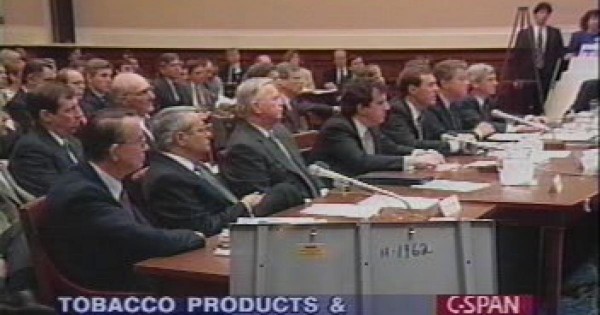
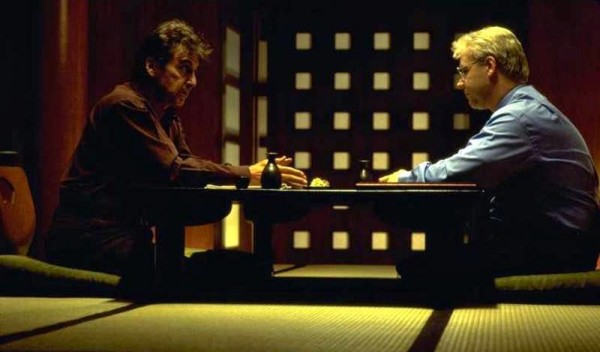 |
Bergman refused to take 'no' for an
answer. Bergman laid out a promising scenario to his
reluctant witness.
•
The most compelling reason to speak up
was Wigand's outrage.
Wigand
still could not believe that
Sandefur had knowingly lied
before Congress alongside six other tobacco company CEOs
that nicotine wasn't addictive.
Wigand knew for a fact that
his former boss had known for
years that it was addictive.
•
Another
motivating factor were a series of
promising anti-tobacco
lawsuits that could actually be
'winnable' if he offered his expert testimony.
•
In addition, several internal B&W documents had been
made public by a paralegal named Merrell Williams.
These documents completely corroborated Wigand's
account.
It looked to Wigand like
Bergman was right... for the first time, Big Tobacco seemed
vulnerable. But it all hinged on Wigand's decision to
speak up.
Wigand took his time to think it over.
It took a lot of coaxing, but Bergman finally
got Wigand to tell him the entire story on camera.
When later asked about his decision to
go public, Wigand would say:
"There was
never an epiphany. It was more
incremental."
Unfortunately for Wigand,
he had no idea
what he was getting himself into.
When
Wigand finally agreed to
do the 60
Minutes interview and his
decision
to testify in the Mississippi anti-tobacco
lawsuit,
it is probably just as well that Wigand
underestimated the enormity of his decision because all hell was about to break loose.
Almost immediately Wigand was
hit with
a mess of frightening lawsuits by B&W.
Then he began to receive anonymous death threats
for himself and for his children.
Then his reputation was destroyed
by a 500-page document released to the press detailing every
piece of dirt the Tobacco cronies could dig up.
The tension leading up to the
scheduled airing of Wigand's story on CBS became unbearable.
And just when the climactic moment was to take place, a
bizarre complication arose.
On the night when the
show was scheduled, something
incredible happened. Just moments before
airtime, CBS panicked and pulled the story!
Mike Wallace had to go on the air and explain why the
widely-publicized program would not be shown that night.
Wigand's decision to go public had led
to one of the most dramatic showdowns in television history.
So what went wrong?
It turned out that Brown and
Williamson was
determined to kill the story. They
threatened CBS with the mother of all lawsuits
for "encouraging"
Wigand to break his air-tight
confidentiality agreement.
The catch-phrase was "tortious interference".
In a nutshell, Wigand had signed an
agreement promising never to reveal details about the
company. Wigand was already being sued on this issue.
Now, in addition, CBS was being
threatened with a lawsuit for "encouraging" Wigand to speak
up in spite of his agreement. In other words, B&W was
prepared to sue because CBS was interfering with Wigand's
binding agreement.
The
tobacco company lawyers told the CBS lawyers something like
this:
"If you let this show go on the air,
it is just a matter of time before Brown and Williamson
will own CBS and you guys will be working for us."
This threat hit home. The CBS lawyers
blinked. This high-stakes risk was way too scary.
The order came down - Pull the show STAT!
The cowardice shown by CBS at the
threat of Big Tobacco has become the stuff of legends.
CBS absolutely folded.
It would not be until the Wall
Street Journal broke the same story a few days later that CBS
regained its nerve.
Now that the Wall Street Journal
had broken the ice, CBS felt safe enough under the legal
umbrella provided by the Wall Street Journal story to go ahead
and finally show its Wigand episode.
Read
Full CBS Story
|
 |
| |
|
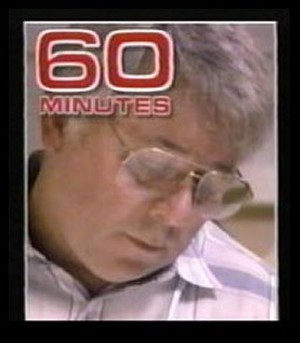 |
So after much
wrangling and hand wringing behind closed doors at CBS,
finally in late 1995 Dr. Wigand appeared on 60 Minutes.
The effect was absolutely
sensational.
Wigand began by announcing
to the world that cigarette companies had known for a
long time that cigarettes were indeed addictive.
Even more sensational was Wigand's assertion that the
heads of the tobacco companies had lied under sworn
testimony to Congress that cigarettes
were
not addictive.
Just as the Tobacco Industry feared, Wigand's
story proved incredibly damaging.
Lowell Bergman had been right all
along... Big Tobacco was
indeed vulnerable. At the time that Wigand stepped
forward in the mid-Nineties, Big Tobacco was facing one
lawsuit after another. These lawsuits claimed that
tobacco causes cancer, that companies in the industry knew
this, and that they deliberately understated the
significance of their findings, contributing to the illness
and death of many citizens in those states.
|
However, Tobacco was still undefeated.
They had never lost
a court case.
They were so rich and powerful that they could buy the
toughest, most blood-thirsty
lawyers. They could use their deep pockets to help elect politicians
who were more than willing to pass
legislation favorable to Tobacco.
And then Wigand spoke up.
Practically overnight, Wigand changed
all of that.
Tobacco's winning streak ended the moment the 60 Minutes
story was finally aired.
For starters,
Wigand's interview
unleashed a firestorm of rage throughout the country.
The entire
country began to gang up on Tobacco with one state after
another taking their turn at suing the industry. Big
Tobacco was being attacked in 50 different directions at
once.
And guess who began to testify for the
States? Yes, Jeffrey Wigand. Once he began
telling the truth, Big Tobacco had no answer.
This firestorm led to the 1998 Tobacco
Master Settlement Agreement.
According to
Wikipedia, the industry was found to have decades of
internal memos confirming in detail that tobacco (which
contains nicotine) is both addictive and carcinogenic
(cancer-causing).
The Tobacco Master Settlement
Agreement was entered in November 1998, originally between
the four largest United States tobacco companies (Philip
Morris Inc., R. J. Reynolds, Brown & Williamson and
Lorillard – the "original participating manufacturers",
referred to as the "Majors") and the attorneys general of 46
states. The states settled their Medicaid lawsuits against
the tobacco industry for recovery of their tobacco-related
health-care costs.
The settlement became a heavy tax on the profits of the
tobacco industry in the US. And tobacco remains
vulnerable to more lawsuits.
Today it is debatable if the
tobacco
industry has a money-producing long term outlook.
From this point on,
Big Tobacco has never been the same.
Jeffery Wigand broke their back.
Today non-smokers across the country
have seen smoking prohibited in many public places. We
all have Jeffrey Wigand to thank for that.
However, the cost to Wigand was
severe. What many people
are not aware of is the intense suffering Dr. Wigand went
through to accomplish this goal.
•
He lost his $300,000 a year job.
•
He lost his severance package.
•
He lost his medical benefits despite
having a very sick daughter and was
forced to use savings to cover her expenses.
•
He lost his wife.
•
He lost his children.
•
He lost his home.
• Wigand had his reputation
assaulted.
His former
employer, Brown and Williamson, developed a 500-page smear
document based on flimsy half-truths and spread it to every
major media outlet in the country, including the New York
Times and the Wall Street Journal.
Dr. Wigand was labeled a
malcontent, a shoplifter, a lousy father, and a wife beater
in front of the entire country as B&W tried desperately to
discredit his credibility.
•
Wigand endured death threats
and shameful threats to harm his children.
• Wigand faced a series of
frightening law suits
threats that could conceivably leave him penniless.
• Wigand faced
a real possibility of prison time involving his decision to
speak out despite having signed a
powerful confidentiality agreement.
• Dr.
Wigand, who has a PhD in biochemistry,
was blackballed in the industry.
He had a tremendous problem finding work.
Unable to find a corporate job after his stint at B& W, he
took a job at DuPont Manual High School, in
Louisville, where he taught science and Japanese for
$30,000 a year -- one-tenth of his former salary.
Guess what? Wigand was soon named teacher of the
year in Kentucky.
As one can see, Dr. Jeffrey Wigand
is a very tough guy. He suffered
greatly. His
bravery came at a terrible cost.
It took a lot of courage for Wigand
to stand up to Big Tobacco, but he didn't back down.
Thank goodness.
There are some who say the Jeffrey
Wigand episode is the most important story ever broken by 60
Minutes.
In that one episode, Jeff Wigand not only
slew the dragon, he changed the world.
Due to Dr. Wigand, our entire planet has
become a better place to live.
Now you know why Jeff Wigand is one of
my heroes.
|
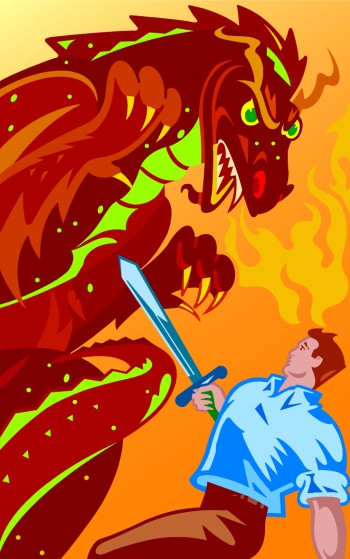 |
More About
Jeff Wigand, The Insider
|
Although these events are 20 years
in the past, perhaps Dr. Wigand’s
story seems vaguely familiar. In
1999, Wigand's David
versus Goliath story
became The Insider,
a critically acclaimed movie
starring Russell Crowe and Al
Pacino.
The film was very well done; it
was nominated for
the Best Picture
Academy Award in 1999.
The Insider tells the
entire story of how this one-time tobacco
executive made front-page news by
revealing his former
employer knew exactly how addictive and lethal
cigarettes were. In
addition, Wigand delivered a damning
deposition in a Mississippi courtroom that
eventually led to the tobacco industry's $246
billion litigation settlement.
Not only did
Wigand's contribution mark the
first real break-through in the legal struggle to hold Big
Tobacco accountable for its damage to our nation’s health,
his stand was even more remarkable
because he knew full
well what incredible personal
risks he was taking.
What
Wigand did took a lot of guts.
Wigand has strong opinions
about his decision to come forward.
"The word
'whistle-blower' suggests that you're a tattletale or that
you're somehow disloyal," he says. "But I wasn't disloyal in the least
bit. People were dying.
I was loyal to a higher order of ethical
responsibility."
|
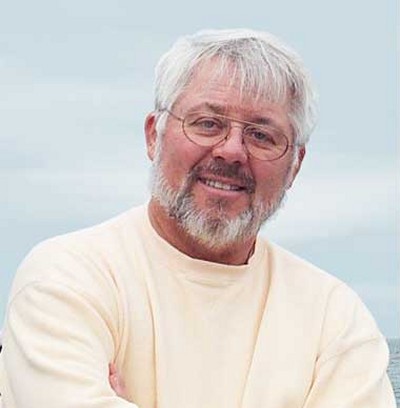 |
Wigand
acknowledges that he paid dearly for going public. Amid lawsuits, countersuits, and an
exhaustive smear campaign orchestrated by the company, Wigand lost his
family, his privacy, and his reputation. His wife divorced him, and
their two daughters went to live with her. Eventually, he left
Louisville, Kentucky and moved to Charleston, South Carolina, hoping to
start over. He was on his own for the first time in years. "After
it was over, I had to
heal," says Wigand. "I didn't want to come out of this
experience bitter."
Once the healing process was over, Dr.
Wigand began to speak out even further on lecture tours
across the country.
To his fascinated audiences, Wigand
described how the tobacco industry "deliberately
obfuscates the truth" about its lethal products.
"It's the only product that when used as intended, kills
you," he says, a line he returns to throughout
each speech.
During his lectures, Wigand will
recite a litany of statistics in his rapid-fire Bronx accent.
•
The
number of people in the U.S. who die each year from smoking-related
illnesses: 430,000.
•
The percentage of adult smokers who started before
they turned 18: 80% to 90%.
•
The amount of money tobacco companies spend
on advertising each year: more than $8 billion.
•
The percentage of
6-year-olds surveyed who associated Joe Camel with smoking: 91%.
"And now I have a question for the audience. What do you
people
intend to do with the knowledge I've shared with you?"
Wigand asks.
At
this, people begin to nod. The smokers who have come
to listen know it is time to stop
smoking. Dr. Wigand is a very persuasive man up there
at the podium. Jeff Wigand has probably persuaded more
people to give up smoking than any man in history.
I realize that
many American heroes
are decorated for risking
their lives in wartime. In
my opinion, Dr. Wigand believed
there was just as real a chance of losing his life as in any
battle. Wigand knew how ruthless
the tobacco people were. He knew full well he was risking
his life. I contend his contribution and his courage make Jeffrey Wigand
as much an American hero
as any man who stormed the beaches of Normandy on D-Day.
By single-handedly
breaking the back of Big Tobacco, Jeff Wigand has probably saved more
American lives than any person since Jonas Salk, the creator
of the polio vaccine.
Further References:
Short version of Jeffrey Wigand's Story
Long version
of Jeffrey Wigand's Story.
Marie Brenner of Vanity Fair wrote an amazing article
“The Man Who Knew Too Much”.
This article became the basis for
Best Picture Oscar Nomination “The Insider”
with Russell Crowe and Al Pacino.
|
|
| |
|
The
Many Faces of Evil
|
 |
|
|
|
Rick Archer's Note: The movie The
Insider was remarkable in many ways. Of course the
most amazing spectacle of all was watching the sudden and
startling fall of Big Tobacco.
Trust me, as the
movie made perfectly clear, Big Tobacco did not go down
easy. They fought back at every turn!! Until you
see the movie yourself, you cannot even conceive the extent
to which Big Tobacco persecuted Jeff Wigand.
Earlier in this
article I made this statement:
I have
learned that the more wealth and power is
vested in any particular industry or profession, the more ruthlessly
it
will protect itself from threats.
Every industry and
profession has an infrastructure designed to protect itself from
competition. How far they take their defensive strategies, and how
far they can take them, is dependent on how powerful that industry
or profession is.
The more concentrated that
wealth and power, the more likely it becomes that
ruthless activities will be employed
to keep the competition at bay.
When I
started my search, I naively thought these corrupt practices were
limited to cancer research. Now I know better. This
practice not only exists in the world of medicine, it extends
throughout banking, energy, politics, the pharmaceutical drug
industry, the health insurance industry, and the auto industry.
Let's go ahead
and
add "Big Tobacco" to that list.
Big Tobacco went
down kicking, hissing and screaming like a horrible hydra
monster fighting Hercules for its life... except in this
case, it was Jeff Wigand slaying the monster.
The biggest
weapon in Big Tobacco's arsenal was its army of pit bull lawyers.
As I watched in morbid fascination, to me these lawyers with
their briefcases were just as terrifying as any Hydra
Monster. To see how these men operate without any soul
or any sign of human compassion is chilling indeed.
After Brown and Williamson had
gotten wind of the Wigand episode, they sent their army of
lawyers to threaten CBS. They promised a lawsuit to
end all lawsuits
for encouraging
Wigand to break his confidentiality agreement. The catch-phrase was "tortious
interference". The tobacco
company lawyers told the CBS lawyers something like this:
"If you let this show go on the
air, it is just a matter of time before Brown and
Williamson will own CBS."
As explained earlier, this threat hit
home. The CBS lawyers blinked. This high-stakes risk
was way too scary for them. The order came down - Kill
the show immediately!!
The case is still studied to this day.
Here is an example:
In Search of a Smoking Gun:
Tortious Interference with Nondisclosure Agreements as
an Obstacle to Newsgathering [source]
Mark J. Chasteen, March 1998
Indiana
University School of Law,
Though the timidity shown by CBS
seems misplaced, the fact that a media institution as
prominent and venerable as 60 Minutes chose to
refrain from broadcasting an important interview means
that this potential source of media liability merits
examination.
Indeed, the assumption that fear
of liability for activity on the boundaries of First
Amendment protection would "chill" speech at the core of
those values seems to be one of the driving forces that
has historically led the Supreme Court to protect
expression and activity that might be of dubious
political value.
|
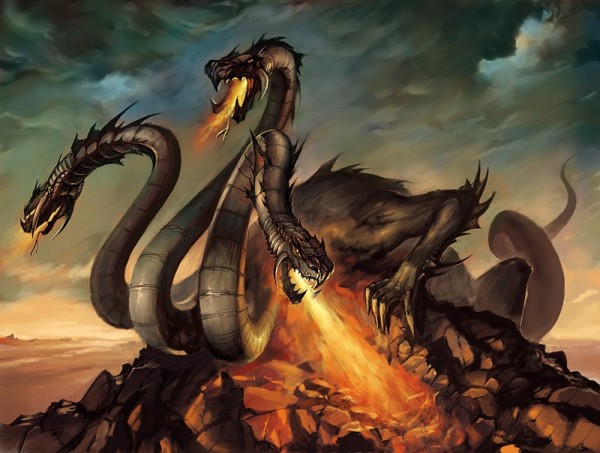
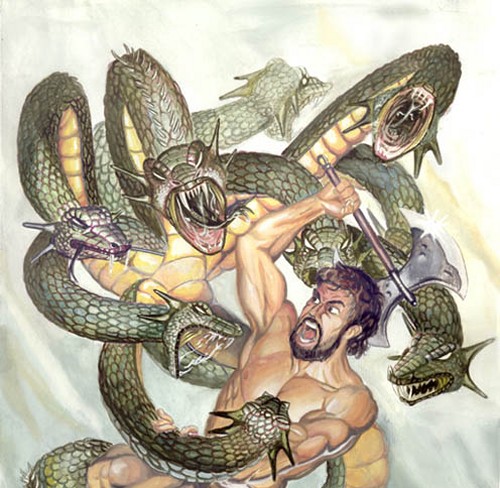
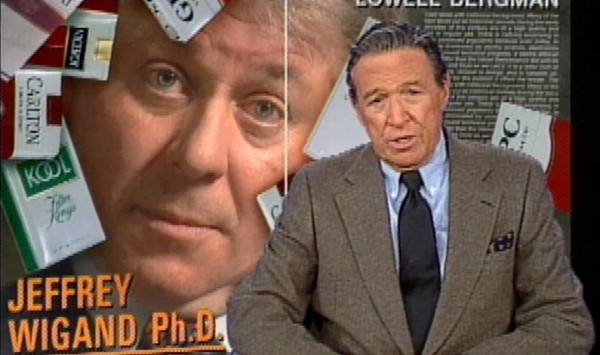
There are some who say the Jeff Wigand
episode is the most important show ever screened on the
prestigious 60 Minutes
|
CBS wasn't the only one who blinked.
Jeff Wigand was absolutely terrified! The Brown and
Williamson lawyers assured him at every turn that he was not
only going to be bankrupted for eternity, he would be going
to jail for having the nerve to speak up.
Here's a
New York Times excerpt on the degree of Wigand's
legal intimidation:
After a
tense day of courthouse maneuvers, a showdown was
building tonight between Brown & Williamson and Jeffrey
Wigand, its former research chief, over whether Mr.
Wigand could divulge company secrets about safer
cigarettes and the health effects of smoking.
On Monday, a state court in Kentucky, where Mr. Wigand
lives and the Brown & Williamson Corporation is based,
continued to bar Mr. Wigand from disclosing any
sensitive information about his work at the company.
After he was dismissed from the company in 1993, Mr.
Wigand agreed not to divulge inside information in
return for health benefits and other compensation. He
also agreed that he would notify the company, which is a
subsidiary of B.A.T. Industries of Britain, about any
public statements he might make about his work.
Mr. Wigand became the center of a dispute when CBS News
two weeks ago canceled the broadcast of an interview
with him on "60 Minutes."
Brown & Williamson, the nation's third-largest tobacco
company, sued Mr. Wigand last week in Louisville,
accusing him of fraud and theft of secrets. It also won
a temporary order from the state court in Louisville
forbidding him from making disclosures before a hearing
in January on a more permanent order.
By the end of the day today, lawyers for Brown &
Williamson said they would ask the Kentucky court to
find Mr. Wigand in contempt if he went ahead with the
deposition on Wednesday.
"Since Wigand has not cooperated with B&W as required
by his agreements and the restraining order, we have no
choice but to seek to hold him in contempt," if he goes
through with the deposition, Gary Morrisroe, a
lawyer representing Brown & Williamson, said in a
statement.
As the movie The Insider made
clear, the tactics of the Brown and Williamson lawyers were
unbelievably intimidating.
CBS was terrified. Wigand was
terrified. When asked by a reporter for a comment,
Wigand replied:
“My children have received death
threats, my reputation and character have been attacked
systematically in an organized smear campaign, and I
have been warned I will end up penniless and in prison...
unless someone is able to kill me first.”
“If they are successful in ruining
my credibility, no other whistle-blower will ever come
out of tobacco and do what I have done.”
From the
Vanity Fair article about Wigand's ordeal:
That night we had
dinner at the revolving restaurant at the top of the
Hyatt. As we sat down at the table, Wigand looked out
the window.
“I don’t believe this,”
Wigand said. “We are
directly across from the Brown & Williamson Tower.”
I [Marie
Brenner] could see
fluorescent light glowing on a single floor in the
otherwise darkened building.
“What is that?” I asked.
“That’s the 18th floor. The legal department. That is
where they are all working, trying to destroy my life.”
The restaurant revolves slowly, and each time the B&W
Tower came into view, Wigand would grimace.
“Look at
that,” he said. “They are still there, and they will be
there tomorrow and they will be there on Sunday.…
You can’t schmooze with these guys. They don’t take
prisoners.”
Another excerpt from the
Vanity Fair article about Wigand's ordeal:
The anti-tobacco
forces depict Jeffrey Wigand as a portrait in courage, a
Marlon Brando taking on the powers in On the Waterfront.
The pro-tobacco lobbies have been equally vociferous in
their campaign to turn Wigand into a demon, a Mark
Fuhrman who could cause potentially devastating cases
against the tobacco industry to dissolve over issues that
have little to do with the dangers of smoking.
According to New
York public-relations man John Scanlon, who was hired by
B&W’s law firm to help discredit Wigand, “Wigand is a
habitual liar, a bad, bad guy.”
It was Scanlon’s
assignment to disseminate a wide range of damaging
charges against Wigand, such as shoplifting, fraud, and
spousal abuse. Scanlon himself, along with B&W, is now
the subject of an unprecedented Justice Department
investigation for possible intimidation of a witness.
For First Amendment
specialist James Goodale, the charges and countercharges
B&W has attempted to level against Wigand represent “the
most important press issue since the Pentagon Papers.”
Goodale, who
represented The New York Times during that period, said,
“You counteract these tactics by a courageous press and
big balls.”
The B&W executives appear to be convinced that they can
break Wigand by a steady drumbeat of harassment and
litigation, but they underestimate the stubborn nature
of his character and the depth of his rage at what he
says he observed as their employee. A part of his
motivation is the need for personal vindication: Wigand
is not proud that he was once attracted to the situation
he came to find intolerable. According to Wigand’s
brother James, a Richmond, Virginia, endocrinologist,
“If they think they can intimidate and threaten Jeff,
they have picked on the wrong person!”
It has become a
dramatic convention to project onto whistle-blowers our
need for heroism, when revenge and anger are often what
drive them. There is a powerful temptation to see
Jeffrey Wigand as a symbol: the little guy against the
cartel, a good man caught in a vise.
However, Jeff Wigand
defies easy categorization. As a personality, he is
prickly, isolated, and fragile—“peculiar as hell” in
Mike Wallace’s phrase—but there seems to be little doubt
about the quality of his scientific information.
Wigand is the most
sophisticated source who has ever come forward from the
tobacco industry, a fact which has motivated B&W to
mount a multi-million-dollar campaign to destroy him.
National reporters
arrive in Louisville daily with questions for Wigand:
•
How lethal are tobacco additives such as coumarin?
•
What did B&W officials know and when?
• And what
does it feel like, Dr. Wigand, to lose your wife and
children and have every aspect of your personal life up
for grabs and interpretation in the middle of a smear?
The Brown and Williamson executives
were more than willing to ruin Wigand's life to protect
their interests.
This destroy-at-all-costs attitude was made clear in the
Vanity Fair article:
“We were a quiet
little company before all this happened,” an executive
for B&W’s Kool brand tells me [Brenner] on a plane ride to
Louisville.
“Then we wound up on
page one.”
I ask him the
standard question in Tobacco Land: “Do you want your
children to smoke?”
The executive
responds irritably, “I see where you are going with
this. You are going to say that an unnamed Kool
spokesman doesn’t want his daughter to smoke.… I think
tobacco has been singled out unfairly.”
And here is my point: Both the
Insider movie and the Vanity Fair article made it
clear that the B&W executives and the B&W lawyers had no
conscience. They would stop at nothing to discredit
Wigand and intimidate him.
Throughout Wigand's ordeal, these men
displayed a total lack of empathy or remorse for their
actions. While on the surface they might display a
superficial charm and persuasive arguments in their favor,
it was obvious they had no grasp of the incalculable damage
their business did to society. All they cared about
was saving their business NO MATTER WHAT IT TOOK TO SUCCEED.
No one quite understands how a tobacco
lawyer can kiss his wife and send his children off to
school, then turn around and spend the rest of the day
trying to destroy a man like Jeff Wigand.
But maybe it is not necessary to
understand what makes them tick. All that is necessary
is to know that these kind of men are dangerous as hell.
They will anything for the money.
In my opinion, the B&W lawyers were part of the many faces
of evil. It is men like these who have helped to create the
widespread corruption that permeates all layers of American
society.
|
The
Sociopathic Personality
|
We have no trouble accepting that there is evil
in the world. People such as Hitler, Stalin, Bin Laden, Bashar Assad and
Saddam Hussein have sent countless people to their death with a mere
shrug of their shoulder.
These people
took complete leave of their moral compass. For that matter,
Napoleon was just as much a monster as Hitler. His brand of
evil infected the entire country of France. Millions died
across Europe and for what?
Not only does evil
flourish in times of war, I think the Godfather Trilogy has
make it clear that evil flourishes in the world of crime.
But how about everyday life? Is it possible that evil lurks in
churchgoers, business leaders, and trusted teachers? The
answer is unequivocally 'yes'.
Evil is not limited to men who commit
genocide or mobsters who assassinate their enemies with little
remorse. There are killers known as "sociopaths" among us in
everyday life.
It might surprise some
to learn, however, that the vast majority of sociopaths aren't
killers lurking in the shadows. Most of them are walking around
among us, immersed in careers that nurture their psychological
traits, and in some cases even reward them.
To the degree of
the power they hold, they can do immense damage.
|
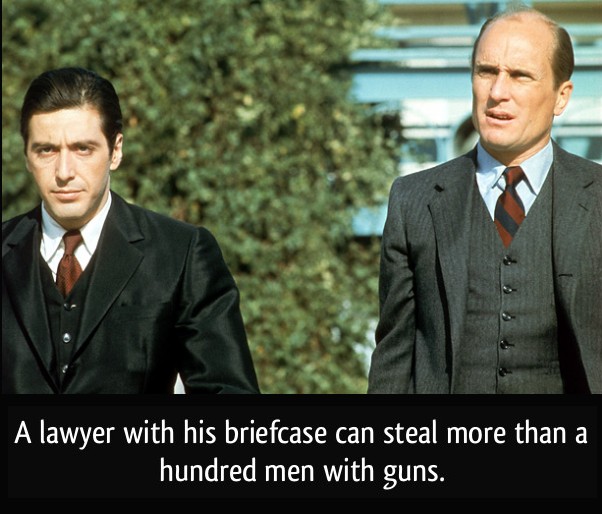 |
Like the B&W executives
and lawyers in the Wigand situation, these sociopaths hide
behind their glibness and superficial
goodwill. They are manipulative and
cunning.
They appear to be charming, yet when the
cameras are turned off, they are covertly hostile and
domineering. They see their victims
as merely an instrument to be used to gain their
ends.
The heartless greed and
sadistic ambition displayed on Wall Street before, during, and after
the 2008 financial collapse has made it clear that many CEOs and
financial czars have little or no conscience. Capitalist
positions of leadership offer power, autonomy, command, and status —
a perfect battlefield for the ambitious and ruthless to compete.
Where once pyramids towered above the desert in tribute to vain and
all-powerful
pharaohs, today it is the skyscrapers and corporate logos that have
become the new symbols of ruthlessness.
Lawyers and CEOs go hand in hand. They cloak themselves in the
strange, arcane realms of the Law. These complicated rules and
laws make laymen completely reliant on
their expertise to survive in a courtroom.
In the murky fog of
these spin masters with their legalese and twisted logic, one can only hope your shark
is better than their shark.
There's a good reason why
Shakespeare hated the lawyers. Lawyers have a well-earned reputation for
distorting the systems of fairness and equality for the purposes of
ensuring their financial success. They don't care about what's
'right' or 'good for humanity'. They only wish to serve their
master and receive their blood money.
For every white knight
district attorney looking to uphold the pillars of justice, you are
sure to find a teeming mass of amoral, bleak-hearted cynics and
cutthroats hiding and scheming in the shadows. These men are
part of the many faces of evil.
A sociopath is able to rationalize their
self-serving behaviors as permissible.
They see cheating as perfectly acceptable.
Cheating at cards, cheating in sports, cheating on their wife,
cheating in business... they feel entitled to
behave any way they choose as "their
right." They are typically pathological
liars. They have no qualms about lying coolly
to your face. It is almost
impossible for them to be truthful on a consistent basis.
The major characteristic of a sociopath is their
lack of remorse, shame or
guilt.
They do not see their victims as people, but only as targets and opportunities.
A sociopath will use their friends
and family if necessary to get what they want. The end
justifies the means; they let
nothing stand in their way.
Carl Shapiro and
Norman Levy considered Bernie Madoff to be their surrogate
son. Imagine how they felt when Madoff turned around and ripped
them off for nearly $700 million!
The question I ask
myself all the time is how do these people live with themselves?
It is one thing to rob faceless people of their savings or deprive
faceless people of a potential cure for cancer, but how does a man
like Bernie Madoff exploit people he knows personally? These were
his friends! They trusted him.
Norman Levy was a
giant of mid-century New York City real estate.
Levy played a huge part by filling the
giant skyscrapers with blue-chip tenants.
Norman Levy treated
Bernie Madoff like son. Indeed, Levy often called Madoff "my
surrogate son". They were also best friends, spending
countless vacations together on Levy's yacht.
Throughout his life,
Levy was very concerned with returning his good fortune to the
community. He often said the most important thing a man can do
is to serve good causes. With that in mind, he established the
Betty and Norman F. Levy Foundation, a charitable institution used
for causes ranging from cancer research to Yeshiva University.
Levy died in 2007. Levy
had trusted Madoff so much that Madoff was named the executor of his
will the and overseer of his charitable foundation.
When Madoff's scheme was
revealed, Levy's reported $244 million in assets went up in smoke.
Now ask yourself what kind of man betrays the trust a decent person
like Norman Levy, a man Madoff called his mentor of 40 years.
Levy had shown Madoff nothing but kindness and was rewarded with
treason.
Prosecutors estimated the size of the
Madoff's fraud
to be $50 billion
dollars.
Madoff was
largely successful in duping so many people out of so much money
because he preyed on his own kind... wealthy Jewish investors.
|
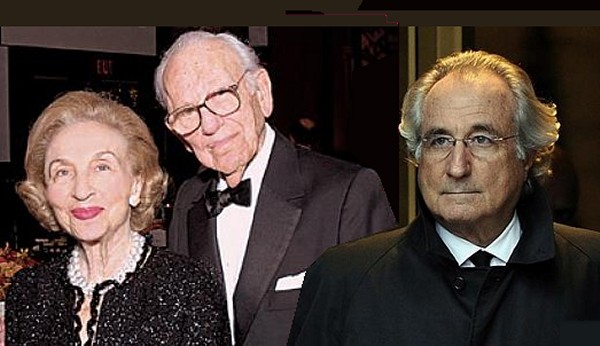
Bernie Madoff was described as the son
Carl Shapiro never had. Madoff took Shapiro
for $400 million.

Bernie Madoff and Norman Levy shared many
vacations together on Levy's personal yacht. They were best
friends. Madoff took Levy for $244 million. And that's
how sociopaths treat their friends.
Madoff
operated the largest private Ponzi scheme in history. In all, Madoff cost investors $50 BILLION dollars.
|
As I said:
A sociopath will use their friends
and family if necessary to get what they want.
For that matter, a
sociopathic attorney will work for a tobacco company like and never
feel a bit of remorse. This cold-blooded behavior was
demonstrated time and again in the Wigand ordeal.
The truth of the
matter is this: There are people in our society who
simply don't care about right and wrong. And the rest
of us are idiots if we expect them to care. They
aren't capable of it.
In its purest form,
sociopathy is not simply a deficit of conscience.
Nor is merely a matter of not feeling as remorseful as society dictates
that one should feel when one wrongs
another person.
Sociopathy is
a complete lack of empathy with other
people on even the most basic level.
If
you explain to a psychopath why he should feel "bad" about the
things he has done another person, rather than reflect on what you
have said and possibly empathize with that person, the psychopath
will simply wonder if there is any way to
manipulate you to cut him a deal or 'forgive him'. He
will try to play you. He will attempt to read you for the socially appropriate reactions and
imitate the social cues of normal human behavior he has learned from
you and other people.
You can ask
for mercy all you want, but why bother? This person
does not have a clue what mercy is.
On a certain level, he lacks a conscience
to such a degree that he has to study other people in order to act
how people act when they feel "guilt."
A sociopath
is a very, very different
kind of life form from you and I.
Some would call these men "monsters".
|
 |
Imagine a world where a
man has no conscience.
There is no limit to what he might do. He can shoot turtles in
the pond for the fun of it, molest little boys or rape helpless
women. A sociopath can rob someone at gunpoint and shoot them just for the pleasure. He can
burn down the house of a neighbor he doesn't like, embezzle money at
work, and tell lies to ruin the reputation of an opponent.
A sociopath sleeps just fine at night because he is
totally free from and guilt, shame,
remorse or concern for
the people he has hurt.
The experts say that 4%
of all people are sociopaths to some degree or another. We
understand that Hitler was a sociopath. We understand that the
fascinating characters in the Godfather Saga were sociopaths.
By definition, criminals are all sociopaths to some degree of
another. That is their
normal way of being. How else does one assassinate unarmed and
unsuspecting targets so
carelessly?
What is hard for us to
accept is that some of our neighbors, parents, spouses, teachers,
children, co-workers and friends could be just as dangerous,
especially if we corner them.
Or in Madoff's case, he can be
dangerous because he has control of our money. Do you ever ask
yourself if your own stock broker can be trusted? I ask myself that
question all the time. I sometimes wonder if one day I will
open a statement and find all my savings have disappeared.
What I would like to
point out is that the capacity for evil exists in all of us, not
just the sociopaths.
Sometimes the evil is
not limited to just a few terrible men. What about the Germans
and Japanese during World War II? How could these otherwise
normal people from such great countries possibly commit such
atrocities? To me, it was mass insanity.
Many of the German
people in World War II knew right from wrong. But through
cowardice, peer pressure, and fear, they found it easier to
cooperate with the Nazis than stand up to them.
Ethics, morals, and
conscience can disappear in a flash under certain circumstances.
If someone's job at a hospital requires overcharging patients and
one is well aware of how difficult a new job would be to find, well,
then the choice might be to look the other way.
Pressure from one's
superiors can make people lose their conscience in a hurry. If
a coach tells you to break the quarterback's leg and you know you
will be cut from the team otherwise, then the choice might be a
tough one to make. You scoff... no one would openly suggest
deliberately hurting one's opponent. Sorry, wrong
answer.
The
NFL began investigating the Saints in 2010 in response to
allegations of deliberate attempts to injure players during the
2009–10 playoffs, but the investigation stalled until late in
the 2011 season. On March 2, 2012, the NFL announced that it had
evidence that defensive coordinator Gregg Williams had created
the program soon after his arrival in 2009, and alleged that
"between 22 and 27 Saints players" were involved.
(source)
Let's fact it... evil
permeates every layer of society and we are constantly forced to
make choices.
If you believe that God
does not want you to kill and your sergeant tells you to shoot the
enemy, hmm, well, most of us would call that a moral dilemma.
If the boss tells you
that insider trading is the only way to succeed as a hedge fund
trader, the temptation to follow his orders must be overwhelming.
I say again that having
a conscience is not a given. It is a luxury. Peer
pressure does strange things to people.
Witness the power
of the Ku Klux Klan to turn citizens of the South into haters.
Witness the power of the Nazi Party to turn an entire populace into
mass murderers.
And I contend that there
are a lot of people in the world of the cancer conspiracy who know
exactly what is going on, but choose to do nothing about it.
Instead, like the rest of us, they stick their head in the sand and
look the other way.
Then the next thing you
know, we have a Holocaust.
First they came for the
Socialists, and I did not speak out—
Because I was not a Socialist.
Then they came for the Trade Unionists, and I did not
speak out—
Because I was not a Trade Unionist.
Then they came for the Jews, and I did not speak out—
Because I was not a Jew.
Then they came for me—and there was no one left to speak
for me.
--
Pastor Martin Niemöller
(1892–1984) commenting on
the cowardice of the
German people following
the Nazis' rise to power and the subsequent purging
of their chosen targets, group after group.
|
Adolf
Eichmann was a German Nazi SS officer who became one of
the major organizers of the Holocaust.
As the Nazis began the invasion of the Soviet Union in 1941,
their Jewish policy changed from emigration to
extermination. Eichmann and his staff became responsible for
Jewish deportations to extermination camps, where the
victims were gassed. After Germany invaded Hungary in March
1944, Eichmann oversaw the deportation and extermination of
that country's Jewish population.
Most of the
victims were sent to Auschwitz concentration camp, where 75
to 90 per cent were killed on arrival.
By the time the
transports were stopped in July, 437,000 of Hungary's
725,000 Jews had been killed in the space of just four
months.
|
Eichmann
said towards the end of the war that he would "leap
laughing into the grave because the feeling that he
had five million people on his conscience would be
for him a source of extraordinary satisfaction".
|
 |
After
his capture, the Israelis were unwilling to take him
to trial based solely on the evidence in documents
and witness testimony, so the prisoner was subject
to daily interrogations.
The
interrogator was Chief Inspector Avner Less of the
national police.
Using documents provided primarily by Yad Vashem and
Nazi hunter Tuvia Friedman, Avner Less was able to
determine when Eichmann was lying or being evasive.
When
additional information was brought forward that
forced Eichmann into admitting what he had done,
Eichmann would insist he had not had any authority
in the Nazi hierarchy.
Then
he added that he had just been following
orders.
Less
noted that Eichmann did not seem to realize the
enormity of his crimes and showed no remorse.
|
|
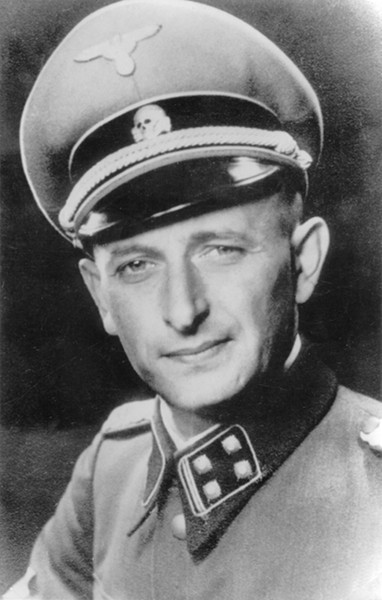 |
Becoming Evil
|
Is someone born a
sociopath or does he develop into one?
Although I
suppose
that some people are born that way, I am also fairly certain that people can
go bad. The reason I watched the transformation of Michael Corleone so carefully is that I believe people can start out decent
and BECOME sociopathic. At the start of Godfather I, Michael Corleone is a pretty decent guy.
He tells his girlfriend Kay repeatedly that he is not like
his father. Then by the end of the movie,
Michael Corleone has all of his enemies executed.
Ironically, the killings
take place during Michael’s renunciation of the devil, as godfather
to his nephew, at the baptism ceremony. The transformation to
sociopath is complete.
Regardless of
whether Michael’s true personality is moral, it is clear
that he no longer considers himself a decent person. The
point of the murders exemplifies Michael’s transformation
into a cold blooded monster.
Then he lies to his wife and claims he had nothing to do with all
those executions. In his denial of such deeds to his wife,
Michael signals to the audience that his identity as a Mafia don has
replaced his original personality.
|
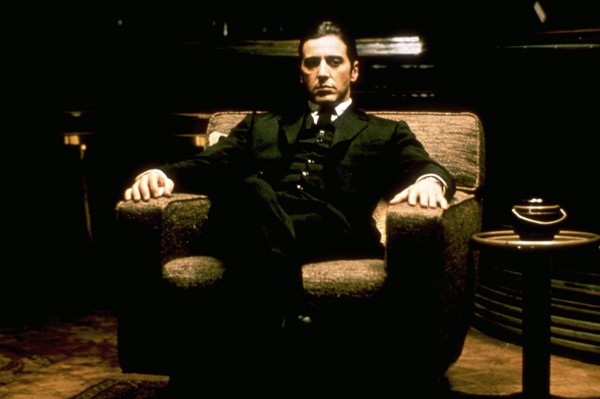 |
Walter White,
the sociopathic anti-hero of Breaking Bad, started out as
a decent human being with a conscience. He was a
teacher who took his job as an educator seriously.
However, when he got sick, a strange set of circumstances led him to cook
methamphetamines to pay for his cancer treatment.
Over time his
new role as a drug manufacturer forced him to make evil
choices. Each time he was forced to quell his
conscience to commit new crimes, he grew colder. By
the end of the show's run, White had turned completely dark.
Admittedly
Corleone and White
are fictional examples, but I say they represent what can
happen if evil is allowed to flourish.
It is possible for good people to go bad under stressful
circumstances.
Not only is it possible, it happens all
the time. If someone thinks it is important enough to
suspend their morals, they will. And each time they
suspend their morals, it gets easier to do the same thing
the next time as well.
|
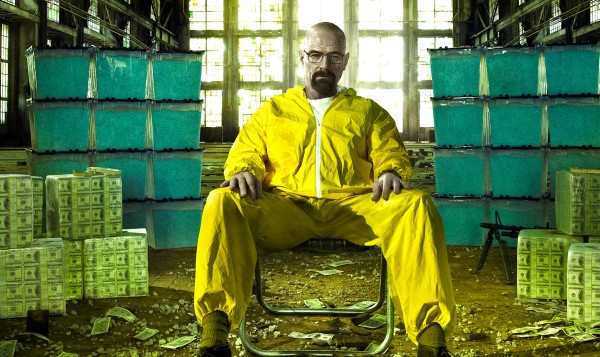 |
When people go bad, they
put their selfish interests over the interests of the public good.
That is the
basic meaning of the phrase "Power Corrupts".
The problem for decent
citizens is that the people who have gone dark have a huge advantage
over their soft-hearted, trusting peers.
A track star discovers
his closest rival is doping. Suddenly his rival begins to pull
ahead. What does the track star do... accept the situation or
level the playing field by cheating as well?
Or a cyclist knows that
Lance Armstrong is doping. In fact, every cyclist at the top
is doping. What does the cyclist do?
These pressures abound
throughout society. The temptation to take the immoral route
can be overwhelming at times.
Enron had an
especially ruthless policy. They would
automatically fire its 10% lowest-performing traders each year.
Think of the pressure that put on the traders to succeed. This
pitted every trader against each other.
This pressure to be the
best according to the corporate mindset created
all kinds of problems. People were forced to do "whatever it
takes" just to keep their job. If the other guy was cheating as
a way to keep his job, now you are probably forced to cheat as well.
That attitude created some serious moral dilemmas. I think we
can assume these dilemmas were responsible for sucking half the company over to the Dark Side.
Thanks to Enron's ruthless corporate
culture, the decent people were soon weeded out and now only the most corrupt
remained. It was these guys who then moved into the positions of power.
Wikipedia: The California electricity crisis, also known
as the Western U.S. Energy Crisis of 2000 and 2001, was a
situation in which the State of California had a shortage of
electricity supply caused by market manipulations, illegal
shutdowns of pipelines by the Texas energy consortium Enron, and
capped retail electricity prices. As a result of Enron's
"gaming the market", California was plagued by constant multiple
large-scale blackouts over a two-year span.
And look how that
strategy worked
out for Enron. These sociopaths considered themselves "The
Smartest Guys in the Room". In the end, by letting the crooks
run the asylum, the entire company went down in smoke.
Another business with
similar ethical shortcomings was Arthur Andersen, the
accounting firm that was vaporized thanks to the Enron Scandal.
Barbara Ley Toffler, an
Andersen staff member, wrote a book about her experiences there.
She said it was a pity for 85,000 ex-staffers that Andersen's ruling
partners never saw the need for a mechanism to police themselves.
Otherwise they might never have been dragged into ruin by the
seemingly see-no-evil work they did at such tarnished giants as
Waste Management (WMI), Sunbeam, WorldCom, Qwest Communications (Q),
Global Crossing, and, most deadly of all, Enron.
Instead, Toffler
suggests in Final Accounting: Ambition, Greed, and the Fall of
Arthur Andersen, the once squeaky-clean Andersen had grown so
obsessed with revenue that its leaders waffled on the firm's ethics
and those of their notorious clients.
In her book, Toffler expressed contempt for an outfit that
"represented the worst in American business". She wrote about
the peculiar culture that brought about the debacle. Toffler's
Arthur Andersen was a place where the pursuit of revenues was the
Holy Grail. Andersen was dedicated to "Billing Our Brains
Out".
Thus the slide from the
demanding and disciplined audits Andersen once did into far more
lucrative--but ethically compromising--consulting. Partners told her
to drive up her billings, even if they were unjustified. And so
exalted were the partners in Andersen's hierarchy-is-almighty milieu
that underlings feared speaking up. Worse, thanks to a bizarre
revenue-crediting arrangement, staffers spent as much time trying to
cut one another out of new business as they did trying to develop
it. Andersen, she suggests, was a "brutally cutthroat" place where
"I learned to try to screw someone else before they screwed me."
(source)
Arthur Anderson, of course, was the accounting firm that let Enron
get away with murder on its financial statements, then turned around
and tried to hide its complicity by shredding thousands of documents
once Enron began to implode.
It does not an accident
that Arthur Andersen and Enron became bed partners. Both
companies had something in common - a hunger for profits no matter
how they were obtained and a tendency to look the other way at
unethical behavior.
• What does the Savings
and Loan Crisis of the Eighties say about American Business Ethics?
•
What does the Enron example say about American Business Ethics?
•
What does the Wall Street collapse say about American Business
Ethics?
•
What does Bernie Madoff say about American Business Ethics?
All four examples show
that Power Corrupts. The Twisted Golden Rule prevails.
So why do so many human
beings immediately look the other way when they see evil? I
think the answer is simple. They want to enjoy their lives.
No one wants to go through the horror of what Jeff Wigand
experienced. In the end, they prefer to see no evil and keep
their mouth shut. Then they concoct some stupid
rationalization about "just following orders".
Labaton Sucharow is a
powerful New York law firm. In 2012, people from this firm
conducted a survey of 500 banking and trading professionals.
Labaton Sucharow published their findings in a remarkable report
titled "Corporate
Integrity at a Crossroads".
Here is an excerpt:
Here in 2012 we
approach the fourth anniversary of the collapse of Lehman
Brothers, the harbinger of the global financial crisis.
Companies went out of business, millions of employees lost their
jobs and countless investors lost their life savings.
What prompted the
scandals that played a central role in the downfall of so many
institutions? Call it greed. Call it slack compliance. Call it
conflicts of interests. The fact is, too many organizations
–both central to the crisis and in its periphery– have lacked a
strong culture of integrity.
In the end, one of
the most significant lessons to emerge from the global economic
crisis is that corporate ethics matter
We surveyed 500
professionals–evenly split across the United States and the
United Kingdom–working in various segments of the financial
services industry. We asked about personal ethics, corporate
culture and possible misconduct. We asked about competitors. We
asked about the regulators and law enforcement authorities that
oversee the financial services industry.
The results were both alarming and, in some cases, encouraging.
Among our key findings:
• Misconduct is still widespread in the financial services
industry; 26% of respondents indicated that they had observed or
had firsthand knowledge of wrongdoing in the workplace.
• Nearly one-fourth of respondents believed that financial
services professionals may need to engage in unethical or
illegal conduct in order to be successful.
• An alarming number of financial services professionals,
16% of respondents, would commit a crime – insider trading – if
they could get away with it.
As one might gather,
'Corporate Integrity' is a phrase that is rapidly becoming an
oxymoron along the lines of "Military Intelligence".
So who should we worry
about more, the 4% of the sociopaths in society or the 16% would-be
Bernie Madoffs on Wall Street who would use Insider Trading to take
our money if they thought they could get away with it?
To be honest, I wouldn't
be surprised if the two groups were actually the SAME PEOPLE.
There are theories that
suggest sociopaths are drawn to certain professions... Wall Street
being one of those professions. The less
talented are drawn to criminal behavior or jobs like police work or
prison work where they get to exercise their thirst for power.
The more talented
sociopaths are drawn to become lawyers, business executives,
politicians, and financial investors.
This is not to say all
financial investors, lawyers and business executives are sociopaths. But
many are. Look at the Wigand
situation. Are you telling me that CEO Thomas Sandefur wasn't
a sociopath? Here is a man who knew his product killed people,
but that didn't stop him. And how else could
those B&W lawyers defend a lying Tobacco executive with a straight face?
It is
said that power corrupts, but actually it
is more true that power attracts the
corruptible. The
sane are usually attracted by other things than
power.
--
David Brin
"It's time you learned the facts of life. You
see, there are really only two kinds of people
in the world, the eaters and the eaten. You just
have to make up your mind which group you're
going to be in. When you have the power,
you don't have to tell the truth. That's a rule
that's been working in this world for
generations. And there are a great many
people who don't tell the truth when they are in
power in administrative positions."
-- Dr. Dean Burk, NCI biochemist
and cancer researcher
|
And what about
politicians? Hmm.
One morning I watched as
Brian Stelter, the 'Reliable Sources' anchor
on CNN, spoke with Politico
CEO Jim VandeHei.
Stelter asked Vandehei
what was the reason for his
company's recent expansion.
VandeHei replied,
"There
are a lot of politicians
and a lot of stories,
but not many people covering them.
And what happens when politicians
don't have people covering them?
Not Good..."
Amen to that. Do
any of us trust our politicians? I certainly don't.
Although I believe that many politicians are good people, I also
believe some of the most dangerous people in America represent us in
Washington.
The story of Harry
Markopolos will demonstrate quite clearly why I feel this way.
| |
Harry
Markopolos
|
A whistleblower is a person who exposes misconduct, alleged
dishonest or illegal activity occurring in an organization.
The alleged
misconduct may be a violation of a law, rule, or regulation.
The misconduct may pose a direct threat to public interest,
such as fraud, health and safety violations, and corruption.
Whistleblowers
typically make their allegations in one of two ways.
They can work internally to other people within the accused
organization.
For example, Sharron Watkins of Enron
fame used this route, but unfortunately no one listened to
her. Jeff Wigand initially used this same route, but got
fired for his efforts.
Usually the more
effective way is to go outside the organization
externally to regulators, law enforcement agencies, to the
media or to groups concerned with the issues. This
doesn't always work either.
|
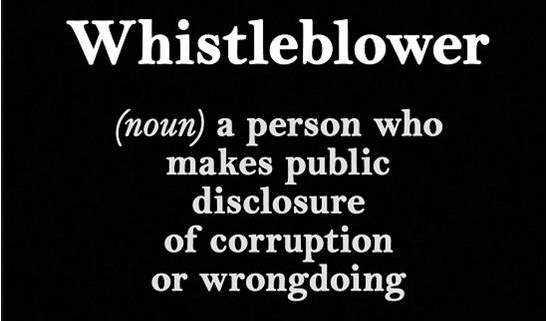
|
Ethical
questions abound about the legitimacy of whistleblowing and
the moral responsibility of whistleblowing. Jeff
Wigand had this say:
"The word
'whistle-blower'
suggests that you're a tattletale or that you're somehow
disloyal. But I wasn't
disloyal in the least bit. People were dying. I was
loyal to a higher order of ethical responsibility."
"They can't blow
smoke at me," Wigand added. "I
constantly keep them
(Tobacco) on the truth course. I keep the truth lit,
and they don't like it."
"But I'm not
afraid because I am not alone
anymore. I've got more
people who have stepped forward to
shine the light on them now."
"Either you're
part of the problem, or you're part of the solution."
"If you think
you're moral and your company is immoral, you're by
definition amoral until you step
forward."
|
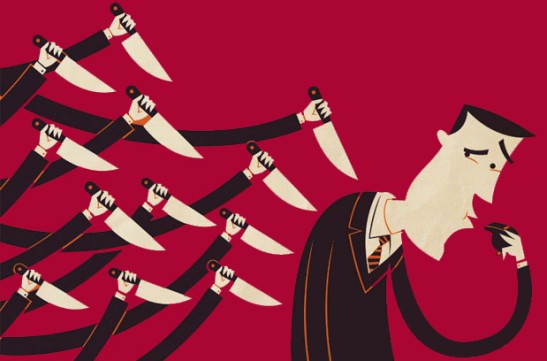 |
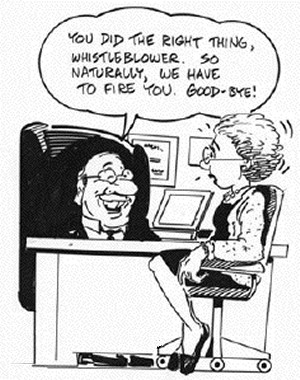 |
Whistleblowing is definitely not for the weak at heart.
At the
very least, Whistleblowers frequently face reprisal.
The
repercussions usually start at the hands of the
organization or group which they have accused, but
sometimes from related organizations, and sometimes
under law.
Depending on the level of corruption, there could be
serious danger as well.
As Jeff
Wigand's situation makes obvious, it took real guts
to come forward. Wigand had everything to
lose... and he did lose it. At the time,
Wigand lost everything in this world he held dear.
Wigand
also feared for his life.
And so did Harry Markopolos.
|
So you ask who is Harry
Markopoulos? This is the guy who spent 8 years trying
to get someone to listen to him about Bernie Madoff.
Had
someone listened to Markopolos, perhaps this terrible tale
might have had a better ending.
Harry
Markopolos was an accountant and private fraud investigator
who was unknown outside of Boston. Oddly enough,
Markopolos never met Bernie Madoff in his entire life.
But Markopolos used math and a gut instinct to smoke the man
out from afar.
In a remarkable
2009
60 Minutes interview with Steve Kroft, Markopolos
was asked how many times he tried to blow the whistle on
Madoff.
By his own count, Markopolos attempted
FIVE SEPARATE TIMES to warn the SEC, Securities and Exchange
Commission, that Madoff was a crook.
Read that number
again: Markopolos blew the whistle on Madoff FIVE TIMES
|
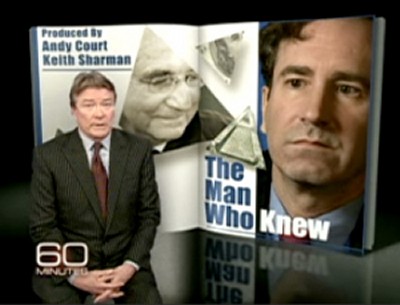 |
Here is what Markopolos told
Steve Kroft:
"I made five separate SEC submissions.
• May
2000
• October 2001
• October, November, and December of 2005
• June 2007
• April 2008
And no one ever chased down any of my leads."
It staggers the
mind to think that no serious effort was ever made to look
into Markopolos' suggestions.
Imagine
the damage that could have been avoided if someone
had taken Markopoulos seriously in the beginning.
In the end, Markopolos
had a theory why his warnings were ignored.
He believed certain
people in the SEC and government knew about Madoff
and protected him.
Harry Markopolos
never actually met Bernie Madoff in his life. Markopolos got
onto Madoff's trail for an unusual reason... his boss chewed
him out for not being as good as Madoff!
The boss had
read a business article praising Bernie Madoff's unusual
success. He called Markopolos into his office
and said, "Why the hell can't you produce numbers like
that?"
Markopolos was
taken aback. He had
no response. Clearly Madoff was a genius of some sort.
His boss said,
"Markopolos, I want you to take a look at this Madoff operation.
Maybe you can figure out what his strategy is and use it for
your own gain."
Chastened,
Markopolos decided to take his boss up on his suggestion.
This is what what happened next.
|
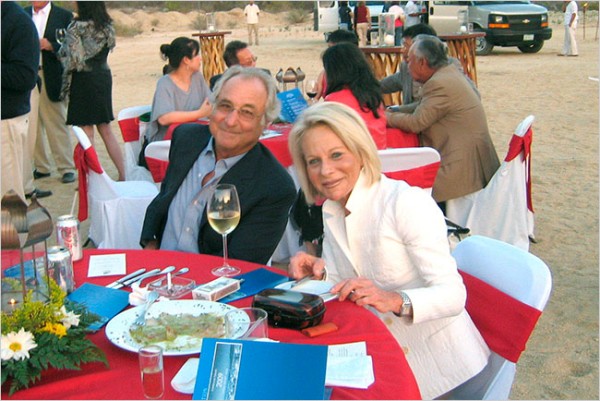
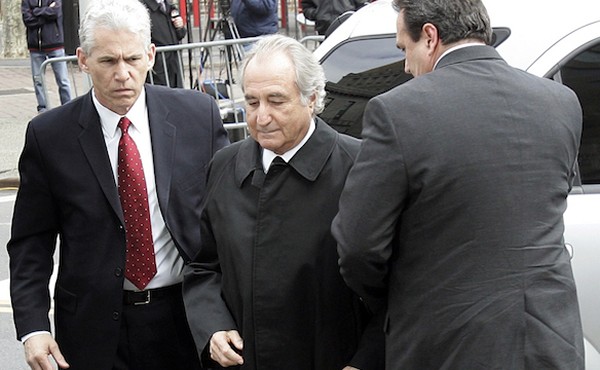 |
Excerpts
from the Harry Markopolos Interview with Steve Kroft
Kroft
Narration: It began a decade
ago, when Markopolos was working for a Boston investment firm.
His boss told him that Madoff, a former chairman of the NASDAQ
stock exchange, was running a huge unregistered hedge fund that
was producing incredible returns. He wanted Markopolos to
reverse-engineer its trading strategy and revenue streams so the
firm could duplicate Madoff's results.
Markopolos: "Madoff had the patina of being a respected citizen. One of the most
successful businessmen in New York, and certainly, one of the
most powerful men on Wall Street. You would never suspect him of
fraud. Unless you knew the math..."
Kroft: "I mean, you're like a math guy, right?"
Markopolos: "I've taken all the calculus courses, from integral calculus
through differential calculus, as well as linear algebra. And
statistics, both normal and non-normal"
Kroft Narration: I asked Harry Markopolos how long it took him to figure out something was wrong
Markopolos:
"It took me five minutes to suspect that it was a
fraud. It took me another almost four hours of mathematical
modeling to prove that it was a fraud. "
Kroft Narration: It was the performance line that
caught his attention.
Markopolos:
"As we know, markets go up and down, and Madoff's only
went up. He had very few down months. Only four percent of the
months were down months. That would be equivalent to a
baseball player in the major leagues batting .960 for a year.
Clearly impossible. You would suspect cheating immediately."
Kroft: "Maybe he was just good."
Markopolos: "No one's that good."
Kroft Narration: Markopolos said there were only two plausible explanations:
either Madoff was using insider information to rack up the huge
profits or he was running a giant Ponzi scheme.
Kroft: "So either way, he was doing something illegal?"
Markopolos: "Either way, I knew he was going to go to prison"
Kroft Narration: In May 2000, Markopolos took his suspicions about Bernie Madoff
to the Boston office of the SEC (Securities and Exchange Commission).
I asked him if he had any financial motive
Markopolos:
"Yes. Madoff
was a competitor of mine in 2000 to 2004, while I was still in
the industry. And when someone who's a dirty player is competing on your playing
field, you want him tossed off the field."
Kroft Narration: Markopolos also thought he might be eligible for a sizable reward if the
fraud involved insider trading, but that turned out not to be
the case.
Kroft: "In your first letter to the S.E.C. back in 2000, you're a
little tentative. You say, 'Look, I have no hard evidence, no
smoking gun.'"
Markopolos: "In 2000, it was more theoretical. In 2001, it was a little bit
more real. By 2005, I had 29 red flags that you just couldn't
miss on. By 2005, the degree of certainty was approaching 100
percent."
As Steve Kroft pointed
out, Harry Markopolos began
sounding the alarm about Madoff to the S.E.C. in 2000.
When
the S.E.C. took no action, Markopolos was incredulous. Now he began a crusade to prove his
point. In 2005 he sent regulators a 19-page memo entitled “The
World’s Largest Hedge Fund Is a Fraud.”
The 19-page memo
contained a list of 29 different red flags pointing to reasons why
anyone with a brain should be suspicious.
29 RED FLAGS and
still nothing was done.
Madoff continued to walk around
scot-free
for three more years. Ultimately Markopolos had nothing to do
with Madoff's demise.
Instead Madoff was done in by the
incompetence on Wall Street in 2008. The crashing markets led to an old-fashioned
"run on the bank". When the markets went bad, many of Madoff's
investors needed some of their money at the same time. Madoff
was unable to raise the cash fast enough to cover his Ponzi Scheme.
In other words, in the end, despite
eight years of desperate attempts to call attention to
the crook, Markopolos didn't have a thing to do with
exposing Madoff.
However,
once Madoff was caught, now people began to notice
that some guy named "Harry Markopolos" had been
pointing his finger at Madoff for the past eight years.
Finally Markopolos had their attention.
Markopolos hinted that corruption was what protected
Bernie Madoff from being caught sooner.
For example, Markopolos found it
fascinating that none of the largest firms on Wall Street were hurt
by Madoff's collapse. Here is what he told Steve Kroft:
Kroft:
"Who else figured
this out besides you?"
Markopolos: "I would say that hundreds of people suspected something was
amiss with the Madoff operation. If you look at the people who
were NOT victims of Madoff, you'll notice that the major firms on Wall
Street had no money with Mr. Madoff."
Kroft: "I'm quoting from the letter to the Securities and Exchange
Commission, red flag number 20.
#20: 'Madoff is suspected of being
a fraud by some of the world's largest, most sophisticated
financial services firms.'
And then you list some of the
firms. Your report included names of the biggest firms
on Wall Street. And you quote conversations with people
high up in those firms."
Markopolos: "That is correct. And the SEC ignored that. All the SEC had to do was pick up the phone. They never
did."
Kroft: "If you had executives at the biggest investment houses on Wall
Street that knew something was wrong, why do you think they
didn't go to the SEC?" .
Markopolos: "Because people in glass houses don't throw stones. And self
regulation on Wall Street doesn't work."
Kroft Narration: In January 2006 the New York office of the Securities and
Exchange Commission finally opened a case file to look into
Markopolos' allegations about Bernie Madoff. Despite uncovering
evidence that Madoff had mislead them about his investment
activities, the SEC closed the case 11 months later without ever
opening a formal investigation.
The SEC staff said there was "no
evidence of fraud."
|
More About Harry Markopolos
|
Rick Archer's
Note:
The film
Chasing Madoff is actually about Harry Markopolos.
Here Markopolos the thought processes that led him to
suspect Madoff was dirty.
I consider Harry
Markopolos to be a hero along the same lines as Jeff Wigand. He was clearly driven by a
sense of duty and the struggle of right versus wrong.
In addition, he is to be commended for trying as hard as he
did.
Although
Markopolos did not succeed in bringing Madoff down himself,
it obviously wasn't for lack of trying. To me, the
fact that Markopolos did not succeed is very interesting in
itself... I agree with Markopolos that Madoff was being
protected.
The Chasing Madoff
film made it clear that Markopolos came to fear for his life
and his family's safety just as Wigand did.
As Markopolos began to discover just
how vast was the extent of Madoff's crooked dealings,
he was worried enough to begin carrying a weapon.
|
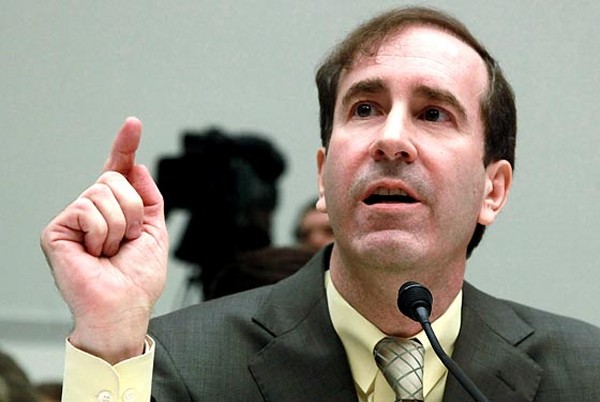 |
Markopolos:
"I know it sounds a
bit paranoid but Bernie was stealing from the Russians and
Columbians. As you know, those two groups have a unique way of handling their
manager termination. If Bernie was discovered stealing from them
— he had a lot of risk on the table. That meant I had a lot to
fear. The FBI told me: With that kind of money, bad things
happen."
Markopolos displayed a
clear distaste for Madoff. He called Madoff a "pathological
liar" and compared him to a Mafia chief. The Chasing Madoff
film often compared Madoff with Al Capone, an analogy Markopolos
said is accurate.
Markopolos:
"Bernie was a modern
day organized criminal, but instead of using Tommy guns he used
pens and a set of golf clubs. Madoff had vast array of people
working for him as feeder funds; they were just preying on other
people."
What Harry Markopolos
did has earned my complete admiration.
Markopolos:
"It's not over.
Someone has to go forward. If people shirk their duty as
citizens, then society falls apart.
I'm proud to say I stepped
forward. I may have had no effect on ultimate resolution
of the Madoff case, but at least I tried."
Mario Puzo,
author of the Godfather, once said,
"The
lawyer with the briefcase can steal more money than
the man with the gun."
Markopolos more or
less said the exact same thing about Bernie Madoff.
Markopolos
said one more thing in his Chasing Madoff movie that
I have not been able to get
out of my mind.
In the Steve Kroft
interview, there was this exchange:
Kroft:
"If you had
executives at the biggest investment houses on Wall Street that
knew something was wrong, why do you think they didn't go to the
SEC?"
Markopolos: "Because people in glass houses don't throw stones. And self
regulation on Wall Street doesn't work,"
In the
Chasing Madoff
movie,
Markopolos gave a very sinister answer to a similar question.
Markopolos was asked why he believed that none of his reports on
Madoff were taken seriously.
Markopolos made it clear
that he believed unknown people in very high places were protecting
Madoff.
For Markopolos to report Madoff five separate times
and get nowhere, Markopolos believed someone at the top had to be sabotaging these
whistleblower attempts.
I firmly believe
Markopolos is right. I completely believe there are people in
Washington and New York who knew about Madoff and protected him.
And why would someone protect a monster like Madoff? Probably because
they had skin the game.
It is preposterous to
think that Markopolos could have reported Madoff five times and been
ignored each time.
I say the biggest cheat
in world history operated scot-free because people in government and
positions of power protected him. To me, this is the only
explanation that makes sense.
Markopolos was asked to testify to a Madoff
fact-finding committee. Here are two excerpts:
"I
feared for my safety as well as my family's
safety until after Madoff's arrest. Bernie
Madoff was one of the most powerful men on Wall
Street. I felt there was great danger in
investigating him. My team and I surmised
that if Mr. Madoff gained knowledge of our
activities, he may feel threatened enough to
seek to stifle us.
During my European visit to investigate Madoff,
I discovered that a large number of funds
invested with Madoff operated offshore. This
meant that the Russian Mafia and Latin-American
cartels almost certainly had money with him."
"Government has coddled, accepted, and ignored
white-collar crime for too long. It is
time the nation woke up and realized that it's
not the armed robbers or drug dealers who cause
the most economic harm, it's the white collar
criminals living in the most expensive homes who
have the most impressive resumes who harm us the
most. They steal our pensions, bankrupt our
companies, and destroy thousands of jobs,
ruining countless lives." (source)
As
Michael Corleone said in the Godfather:
"All my life I kept trying to
go up in society. I wanted to get where everything higher up was
legal.
But the higher I go, the more
crooked it becomes."
So here is a question. If Bernie Madoff could
find people in government to protect him, is it
really that much of a stretch to ask if there are
people in government who protect the interests of
the pharmaceutical drug industry??
|
|
The
Outline of a Cancer Conspiracy
"It took me years to realize that the people in control
of the cancer treatment world today did not want a
simple, quick cure for cancer. It was not in their
economic or career interest. They want complicated
disease syndromes and all the paraphernalia of
techniques, expert analysis, peer group conferences,
papers, discussions, research grants and clinical trials
for years before a new cancer therapy might be allowed.
It is a horrendous crime which serves only those on the
"inside" who are playing the great, lucrative "expert"
game."
- Barry
Lynes, author of "The Cancer Cure That Worked" p.
126
|
Rick Archer's
Note:
In the previous
eight chapters of the Cancer Diaries, I have listed one
story after another that suggest a handful of
shadowy, morally-bereft sociopathic medical executives have systematically impeded the search
for an alternative cure for cancer over the past century. These men
represent hospitals, health insurance companies, and
government medical agencies.
If you don't
believe me by now, there is nothing more I can say that will
change your mind. But I am completely convinced there
is a major conspiracy in the domain of cancer treatment. These
shadowy have made
sure to bribe politicians to rig our laws so that doctors, hospitals, drug companies
and health insurance giants can rob the American public blind.
These shadowy
men are the anonymous, faceless executives who make
cold-hearted 'business decisions' to persecute people like
Royal Rife or Max Gerson in an attempt to protect their
highly profitable cancer-based empire.
I don't have a
clue who these men are. I wouldn't know them if I
bumped into them on a street. I feel the anger, but it
is targeted towards invisible faces. Nevertheless, I completely
believe that these people exist. Like germs, we can't
see them, but we know they are there and we know they are
dangerous. I contend that their cynical decisions have
led to the death of many innocent people who were unable to
benefit from natural cancer cures.
|
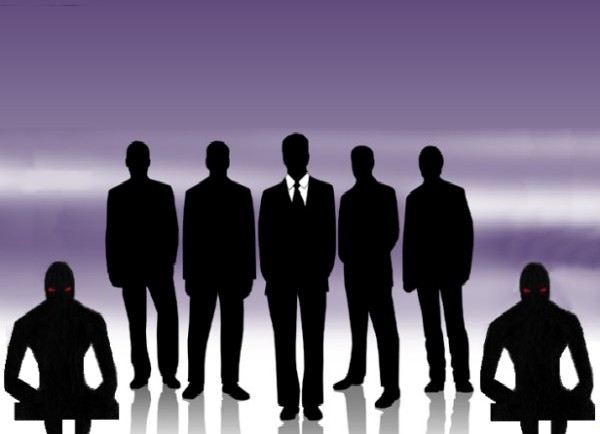 |
So how do we get
rid of these people? How do we solve the cancer
crisis?
Funny you should
ask. I have given this a lot of thought.
The breakthrough
could come from several directions.
One possibility
is that Stanislaw Burzynski's antineoplaston cancer
treatment might turn out to be effective. Burzynski is
to be admired for his brave 30 year battle against FDA
corruption. However, one has to wonder why there seems
to have been so little progress in the past few years.
Another
possibility is that mainstream medicine seems to be getting
closer to defeating cancer. From the start, the
rationale for suppressing "alternative" forms of cancer
treatment has been to allow cancer research enough time to
find a cure that will enrich the pharmaceutical industry.
The problem is that synthetic drugs don't seem to retard
cancer anywhere near as effectively as natural cures.
That said, recent computer breakthroughs and gene sequencing
tools seem to suggest that mainstream medicine is on the
verge of just such an accomplishment.
A third
possibility is that a hero in the mold of Jeffrey Wigand may
emerge to expose the widespread corruption. Don't
laugh. If someone can single-handedly take down Big
Tobacco, it might just happen in the world of cancer
corruption as well.
And the fourth
possibility is that people in the media who are not under
control of the Cancer Conspiracy will continue to speak. As long as the
media is not completely controlled by the shadowy forces of
evil, then there is hope.
In regards to
Jeff Wigand, let's review this quote:
For First Amendment
specialist James Goodale, the charges and countercharges
B&W has attempted to level against Wigand represent “the
most important press issue since the Pentagon Papers.”
Goodale, who
represented The New York Times during that period, said,
“You counteract these tactics by a courageous press and
big balls.”
Along this line, I applaud 60
Minutes. 60 Minutes seems to target
corruption more effectively than any other news outlet in
America.
With this in
mind, I would like to turn your attention to a recent
October 2014 60 Minutes program that reminded me in
many ways of Jeff Wigand's fateful appearance back in 1995.
Perhaps if 60 Minutes pushes hard enough, lightning will
strike twice...
Wouldn't it be
wonderful to have 60 Minutes find the cancer
equivalent of Jeff Wigand and see the entire cancer fraud come tumbling
down??
Don't laugh...
it could happen. By coincidence, just as I was
wrapping up this final chapter, 60 Minutes did a
story on Cancer Drug corruption.
Wonders never
cease. Let's have a look.
|
|
60 Minutes Reports on the
Cost of Cancer
Drugs
|
October 2014:
Lesley Stahl
discovers the shock and anxiety of a cancer diagnosis can be
followed by a second jolt:
The
astronomical price of
cancer drugs!
Click here to watch this Episode on the Internet
The following is a
script of "The Cost of Cancer Drugs" which aired on Oct. 5,
2014.
Lesley Stahl is the
correspondent.
Richard Bonin
is the producer.
|
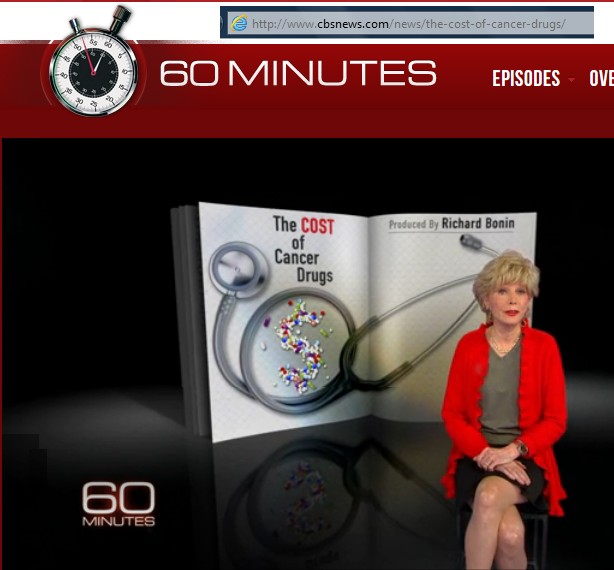
Lesley
Stahl is one of America's most
recognized and experienced broadcast journalists.
Lesley Stahl has been a 60 Minutes correspondent
since 1991.
|
Lesley Stahl Narration:
Cancer is so pervasive that it touches virtually every
family in this country. More than one out of three Americans
will be diagnosed with some form of it in their lifetime.
And as anyone who's been through it knows, the shock and
anxiety of the diagnosis is followed by a second jolt: the
high price of cancer drugs.
They are so astronomical that a growing number of patients
can't afford their co-pay, the percentage of their drug bill
they have to pay out-of-pocket. This has led to a revolt
against the drug companies led by some of the most prominent
cancer doctors in the country.
Dr. Leonard Saltz:
We're in a situation where a cancer diagnosis is one
of the leading causes of personal bankruptcy.
(LS
Narration): Dr. Leonard Saltz is chief of
gastrointestinal oncology at Memorial Sloan Kettering, one
of the nation's premier cancer centers, and he's a leading
expert on colon cancer.
Lesley Stahl: So,
are you saying in effect, that we have to start
treating the cost of these drugs almost like a side
effect from cancer?
Dr. Leonard Saltz: I
think that's a fair way of looking at it. We're
starting to see the term "financial toxicity" being
used in the literature. Individual patients are
going into bankruptcy trying to deal with these
prices.
"I do worry that people's fear and anxiety's are
being taken advantage of."
Lesley Stahl: The
general price for a new drug is what?
Dr. Leonard Saltz:
They're priced at well over $100,000 a year.
Lesley Stahl: Wow.
Dr. Leonard Saltz: And
remember that many of these drugs, most of them,
don't replace everything else. They get added to it.
And if you figure one drug costs $120,000 and the
next drug's not going to cost less, you're at a
quarter-million dollars in drug costs just to get
started.
Lesley Stahl: I
mean, you're dealing with people who are desperate.
Dr. Leonard Saltz: I
do worry that people's fear and anxiety are being
taken advantage of. And yes, it costs money to
develop these drugs, but I do think the price is too
high.
(LS
Narration): The drug companies say it costs over
a billion dollars to bring a new drug to market, so the
prices reflect the cost of innovation.
The companies do provide financial assistance to some
patients, but most people aren't eligible. So many in the
middle class struggle to meet the cost of their co-payments.
Sometimes they take half-doses of the drug to save money. Or
delay getting their prescriptions refilled.
Dr. Saltz's battle against the cost of cancer drugs started
in 2012 when the FDA approved Zaltrap for treating advanced
colon cancer. Saltz compared the clinical trial results of
Zaltrap to those of another drug already on the market,
Avastin. He says both target the same patient population,
work essentially in the same way. And, when given as part of
chemotherapy, deliver the identical result: extending median
survival by 1.4 months, or 42 days.
Dr. Leonard Saltz:
The two drugs looked to be
about the same. To me, it looked like a Coke and
Pepsi sort of thing.
(LS Narration): Then Saltz,
as head of the hospital's pharmacy committee, discovered how
much it would cost: roughly $11,000 per month, more than
twice that of Avastin.
Lesley Stahl: So
$5,000 versus $11,000. That's quite a jump. Did it
have fewer side effects? Was it less toxic? Did it
have...
Dr. Leonard Saltz:
No...
Lesley Stahl: ...Something that would have
explained this double price?
Dr. Leonard Saltz:
If anything, it looked like there might be a little
more toxicity in the Zaltrap study.
(LS Narration):
Saltz then contacted Dr. Peter
Bach, Sloan Kettering's in-house expert on cancer drug
prices.
Lesley Stahl: So
Zaltrap. One day your phone rings and it's Dr. Saltz.
Do you remember what he said?
Dr. Peter Bach:
He said, "Peter, I think we're not going to include
a new cancer drug because it costs too much."
Lesley Stahl: Had you ever heard a line like
that before?
Dr. Peter Bach:
No. My response was, "I'll be right down."
Lesley Stahl: You ran down.
Dr. Peter Bach:
I think I took the elevator. But yes, exactly.
(LS Narration): Bach
determined that since patients would have to take Zaltrap
for several months, the price tag for 42 days of extra life
would run to nearly $60,000. What they then decided to do
was unprecedented: reject a drug just because of its price.
Dr. Peter Bach:
We did it for one
reason. Because we need to take into account the
financial consequences of the decisions that we make
for our patients. Patients in Medicare would pay
more than $2,000 a month themselves, out-of-pocket,
for Zaltrap. And that that was the same as the
typical income every month for a patient in
Medicare.
Lesley Stahl: The co-pay.
Dr. Peter Bach:
Right. 20 percent. Taking money from their
children's inheritance, from the money they've
saved. We couldn't in good conscience say, "We're
going to prescribe this more expensive drug."
"It was a shocking event. Because it was irrefutable
evidence that the price was a fiction."
(LS Narration): And then
they trumpeted their decision in the New York Times.
Blasting what they called "runaway cancer drug prices," it
was a shot across the bow of the pharmaceutical industry and
Congress for passing laws that Bach says allow the drug
companies to charge whatever they want for cancer
medications.
Dr. Peter Bach:
Medicare has to pay exactly what the drug company
charges. Whatever that number is.
Lesley Stahl: Wait a minute, this is a law?
Dr. Peter Bach:
Yes.
Lesley Stahl: And there's no negotiating
whatsoever with Medicare?
Dr. Peter Bach:
No.
(Rick
Archer's Note: I
discussed this exact issue in my
previous Chapter titled
The Twisted Golden Rule.
Here is
Excerpt One
from my article:
Of the total $2.8 trillion that will be
spent on health care, about $800 billion will be paid by the federal
government through the Medicare insurance program for the disabled
and those 65 and older and the Medicaid program, which provides care
for the poor. That $800 billion, which keeps rising far faster than
inflation and the gross domestic product, is what's driving the
federal deficit. The other $2 trillion will be paid mostly by
private health-insurance companies and individuals who have no
insurance or who will pay some portion of the bills covered by their
insurance.
This is what's increasingly burdening businesses that pay
for their employees' health insurance and forcing individuals to pay
so much in out-of-pocket expenses.
Increased
out-of-pocket costs to Medicare
beneficiaries and the often
catastrophic costs of long-term
services and supports are major
threats to middle-class security for
retirees and family members, who
often end up in caregiving roles.
(Click
here to read complete paragraph)
|
Lesley Stahl Narration:
Another reason drug prices are so expensive is that
according to an independent study, the single biggest
source of income for private practice oncologists is the
commission they make from cancer drugs. They're the ones
who buy them wholesale from the pharmaceutical companies,
and sell them retail to their patients.
The mark-up for Medicare patients
is guaranteed by law: the average in the case of Zaltrap was
six percent.
Dr. Leonard Saltz:
What that does is create a very substantial
incentive to use a more expensive drug, because if
you're getting six percent of $10, that's nothing.
If you're getting six percent of $10,000 that starts
to add up. So now you have a real conflict of
interest.
(LS
Narration): But it all starts with the drug
companies setting the price.
Dr. Peter Bach: We
have a pricing system for drugs which is completely
dictated by the people who are making the drugs.
Lesley Stahl: How do you think they're
deciding the price?
Dr. Peter Bach:
It's corporate chutzpah.
Lesley Stahl: We'll just raise the price,
period.
Dr. Peter Bach:
Just a question of how brave they are and how little
they want to end up in the New York Times or on 60
Minutes.
(LS
Narration): That's because media exposure,
he says, works. Right after their editorial was published,
the drug's manufacturer, Sanofi, cut the price of Zaltrap by
more than half.
Dr. Peter Bach:
It was a shocking event. Because it was irrefutable
evidence that the price was a fiction. All of those
arguments that we've heard for decades, "We have to
charge the price we charge. We have to recoup our
money. We're good for society. Trust us. We'll set
the right price." One op-ed in the New York Times
from one hospital and they said, "Oh, okay, we'll
charge a different price." It was like we were in a
Turkish bazaar.
Lesley Stahl: What do you mean?
Dr. Peter Bach:
They said, "This carpet is $500" and you say, "I'll
give you $100." And the guy says, "Okay." They set
it up to make it highly profitable for doctors to go
for Zaltrap instead of Avastin. It was crazy!
(LS Narration): But he says
it got even crazier when Sanofi explained the way they were
changing the price.
Dr. Peter Bach: They
lowered it in a way that doctors could get the drug
for less. But patients were still paying as if it
was high-priced.
Lesley Stahl: Oh, come on.
Dr. Peter Bach:
They said to the doctor, "Buy Zaltrap from us for
$11,000 and we'll send you a check for $6,000."
Then you give it to your patient and you get to bill
the patient's insurance company as if it cost
$11,000. So it made it extremely profitable for the
doctors. They could basically double their money if
they use Zaltrap.
"High cancer drug prices are harming patients
because either you come up with the money, or you
die."
(LS
Narration): All this is accepted industry
practice. After about six months, once Medicare and private
insurers became aware of the doctor's discount, the price
was cut in half for everyone.
John Castellani: The
drug companies have to put a price on a medicine
that reflects the cost of developing them, which is
very expensive and takes a long period of time, and
the value that it can provide.
(LS Narration): John
Castellani is president and CEO of PhRMA, the drug
industry's trade and lobbying group in Washington.
Lesley Stahl: If you
are taking a drug that's no better than another drug
already on the market and charging twice as much,
and everybody thought the original drug was too
much...
John Castellani:
We don't set the prices on what the patient pays.
What a patient pays is determined by his or her
insurance.
Lesley Stahl: Are you saying that the
pharmaceutical company's not to blame for how much
the patient is paying? You're saying it's the
insurance company?
John Castellani:
I'm saying the insurance model makes the medicine
seem artificially expensive for the patient.
(LS Narration): He's
talking about the high co-pay for cancer drugs. If you're on
Medicare, you pay 20 percent.
Lesley Stahl: Twenty percent of $11,000 a
month is a heck of a lot more than 20 percent of
$5,000 a month.
John Castellani:
But why should it be 20 percent instead of five
percent?
Lesley Stahl: Why should it be $11,000 a
month?
John
Castellani: Because the cost of developing these
therapies is so expensive.
Lesley Stahl: Then why did Sanofi cut
it in half when they got some bad publicity?
John Castellani:
I can't respond to a specific company.
(LS Narration):
Sanofi declined our request for an interview, but said in
this email that they lowered the price of Zaltrap after
listening "to early feedback from the oncology community and
... To ensure affordable choices for patients..."
Dr. Hagop Kantarjian:
High cancer drug prices are harming patients because
either you come up with the money, or you die.
(LS Narration): Hagop
Kantarjian chairs the department of leukemia at MD Anderson
in Houston. Inspired by the doctors at Sloan Kettering, he
enlisted 119 of the world's leading leukemia specialists to
co-sign this article about the high price of drugs that
don't just add a few weeks of life, but actually add years,
like Gleevec.
It treats CML, one of the most common types of blood cancer
that used to be a death sentence, but with Gleevec most
patients survive for 10 years or more.
Dr. Hagop Kantarjian:
Gleevec is probably
the best drug we ever developed in cancer.
Lesley Stahl: In all cancers?
Dr. Hagop Kantarjian:
So far. And that shows the dilemma, because here
you have a drug that makes people live their normal
life. But in order to live normally, they are
enslaved by the cost of the drug. They have to pay
every year.
Lesley Stahl:
You have to stay on it. You have to keep taking it.
Dr. Hagop Kantarjian:
You have to stay on it indefinitely.
(LS Narration):
Gleevec is the top selling drug for industry giant Novartis,
bringing in more than $4 billion a year in sales. $35
billion since the drug came to market. There are now several
other drugs like it. So, you'd think with the competition,
the price of Gleevec would have come down.
Dr. Hagop Kantarjian:
And yet, the price of the drug tripled from $28,000
a year in 2001 to $92,000 a year in 2012.
Lesley Stahl: Are you saying that the drug
companies are raising the prices on their older
drugs.
Dr. Hagop Kantarjian:
That's correct.
Lesley Stahl: Not just the new ones. So you
have a new drug that might come out at a $100,000,
but they are also saying the old drugs have to come
up to that price, too?
Dr.
Hagop Kantarjian: Exactly!
They are making prices unreasonable,
unsustainable and, in my opinion, immoral.
(LS
Narration): When we asked Novartis
why they tripled the price of Gleevec, they told us, "Gleevec
has been a life-changing medicine ... When setting the
prices of our medicines we consider ... the benefits they
bring to patients ... The price of existing treatments and
the investments needed to continue to innovate..."
Dr. Hagop Kantarjian:
Gleevec is quite an
expensive medication.
(LS Narration): Dr.
Kantarjian says one thing that has to change is the law that
prevents Medicare from negotiating for lower prices.
Dr. Hagop Kantarjian:
This is unique to the United States. If you look
anywhere in the world, there are negotiations.
Either by the government or by different regulatory
bodies to regulate the price of the drug. And this
is why the prices are 50 percent to 80 percent lower
anywhere in the world compared to the United States.
Lesley Stahl: Fifty percent to 80 percent?
Dr. Hagop Kantarjian:
Fifty percent to 80 percent.
Lesley Stahl: The same drug?
Dr. Hagop Kantarjian:
Same drug. American patients end up paying two
to three times more for the same drug compared to
Canadians or Europeans or Australians and others.
Lesley Stahl: Now, Novartis, which makes
Gleevec, says that the price is fair because this is
a miracle drug. It really works.
Dr. Hagop Kantarjian:
The only drug that works is a drug that a
patient can afford.
(Rick
Archer's Note: I
discussed this issue in Chapter
Eight titled
The
Twisted Golden Rule.
In 2004,
Congress and the G.W. Bush
administration established the
Medicare Part D drug component they
eliminated competitive bidding by
the pharmaceutical industry and
created a windfall for both
industries.
Here is
Excerpt Two
from my
article:
In his 60
Minutes segment titled Under the Influence, Steve
Kroft opened with this statement:
"If
you have ever wondered why the cost of prescription
drugs in the United States are the highest in the world
or why it's illegal to import cheaper drugs from Canada
or Mexico, you need look no further than the
pharmaceutical lobby and its influence in Washington,
D.C."
Steve
Kroft went on to expose a series of highly questionable
moves on the part of several Congressman in regards to the
passage of a controversial pharmaceutical drug bill in 2003.
If you had any doubt before,
this story will make it perfectly clear that our government
is run by certain people with highly questionable integrity.
Let me say this again -
Whoever owns the gold
makes the rules.
(Click
here to read complete story)
|
(LS Narration):
The challenge, Dr. Saltz at Sloan Kettering says, is
knowing where to draw the line between how long a drug
extends life and how much it costs.
Lesley Stahl:
Where is that line?
Dr. Leonard
Saltz: I don't know where that line is, but
we as a society have been unwilling to discuss
this topic and, as a result, the only
people that are setting the line are the people
that are selling the drugs.
Follow-up Story: The Eye-Popping Cost of Cancer
Drugs
(LS
Narration):
As the 60 Minutes team
reports, cancer drug prices have the potential to
bankrupt a family.
Lesley Stahl: "People don't just take
one drug. It accumulates. They take two, or
sometimes three. And each drug can cost
$100,000," Stahl tells 60 Minutes Overtime.
"It's really heartbreaking."
60 Minutes Producer Peter Bonin: "Secondly,
I never knew that for many oncologists, when
they prescribe cancer drugs, they actually get a
commission."
The argument is that if you can make 6% off
$10,000 versus 6% off 1000, there is an unspoken
incentive to opt for the more expensive drug."
Lesley Stahl: "So there is a built-in
conflict of interest. This means there is
a built in incentive to prescribe the highest
priced drug. The whole system is out of
kilter."
|
Final Words:
Is
there really such a thing as an Alternative Cancer Cure?
|
"I know for an absolute stone cold fact that at least a
dozen very effective cancer treatments have been
suppressed by mainstream medicine in the last 70 some
years.
See my research
into some of these treatments and the books referenced
on my site for the enormous amount of evidence
supporting my conclusions. "
-
Gavin Phillips [
source ]
|
Rick Archer's
Note: In my heart, I believe this quote
from Gavin Phillips is true.
My Cancer Diaries
consists of nine chapters. In each chapter, I have discussed
stories of suspicious circumstances where potential cures for cancer
appear to have been deliberately suppressed by dark figures within
the medical and pharmaceutical industry.
In the quote above,
Gavin Phillips suggested he knows of "at
least a dozen very effective cancer treatments have been suppressed
by mainstream medicine".
As for me, I have written stories on six of the treatments that Mr.
Phillips might be referring to:
- Rene Caisse and her Essiac
herbal treatment
- Max
Gerson and his Gerson diet
- Ernest Krebs and laetrile
- Royal Rife and
his beam ray
- Harry Hoxsey and his herbal treatment
- Stanislaw Burzynski and his antineoplaston
cancer cure
Do any of those cures
really work?
To be honest... and I have been honest
throughout... I don't know the answer to that.
What I do know is that I
have read startling reports on the Internet that suggest all six of these people
were subjected to intense intimidation. This intimidation was so extreme that the
degree of harassment in
itself is clearcut evidence that someone feared them enough to
suppress them.
That speaks volumes.
If you want a good place to start reading about "suppression", read the story of
Royal Rife.
Another startling story deals with
Stanislaw
Burzynski, a victim of well-documented systematic
intimidation for nearly forty years.
If the stories about
Burzynski can be believed, someone appears to have been determined to
sabotage these cures and ruin his work at all cost. Whether his treatment is any good or
not I cannot say, but I am appalled at the lengths the medical
conspiracy has gone to suppress his research efforts.
Always keep in mind that
I can't "prove" any of this. All I do is read stories on the
Internet and then pass them on to you. You don't have to take
my word on anything; these same stories are available to you as well.
Please note I post my sources at every turn so that you can read the
same stories as I did and draw your own conclusions.
At some point, the adage
"Where there is smoke, there is fire" kicks in. There
is so much circumstantial evidence surrounding these suppression of
these cures that it defies all credulity to think something sinister
isn't going on.
To quote
Sherlock Holmes, "How often have I said to you that when you
have eliminated the impossible, whatever remains, however
improbable, must be the truth? Eliminate all other
factors, and the one which remains must be the truth."
After reading
the stories of those six individuals - Caisse, Hoxsey,
Gerson, Laetrile, Rife, Burzynski - the most likely
explanation is that there has been an ongoing conspiracy determined to suppress any cancer
cure that the pharmaceutical industry deems dangerous to their
financial interests.
Considering what a
scourge cancer is, I have said repeatedly how shocked I am to believe someone would
deliberately deprive humanity of a cure for cancer. What kind
of depravity exists to allow this to take place?
This anti-life behavior
makes absolutely no sense to a naive person like myself. And
yet I find myself convinced that this is exactly what has happened.
In writing these stories, one can assume all naivety is long since
gone. At this point, I firmly believe that there was promise in every one
of those cures, yet we will probably never know the truth because
each one of those people were stopped in their tracks and their
cures abandoned to wither on the vine.
To call these saboteurs
"immoral" doesn't even begin to convey my feelings of disgust and
disbelief.
I continued to
investigate because I wanted an answer to this question:
Why
would doctors and the Medical Community suppress a potential
cancer treatment?
After nine chapters, I
think I have my answer. I have decided there is so much evil in this world
that certain individuals could care less about letting innocent
cancer victims die if it meant more money and more power.
Genocide
Look no further than
genocide. Man's cruelty to man
knows few limits. Man is capable of unspeakable atrocities.
The fatality totals due
to genocide are unbelievable. When Man concentrates hard
enough, he is a far more effective killer than Mother Nature will
ever be (extinction events excluded).
For example, in the Twentieth Century, there were seven Genocide
situations that counted their victim totals in the millions.
Sorry to bring up such a depressing topic, but I don't think we can
turn a blind eye and sweep these atrocities under the carpet.
Stalin, Hitler, Mao,
Japan, Belgium (atrocities in Congo), Turkey and Cambodia were the parties responsible.
Rwanda came close.
Let's face it -
Men like Hitler, Stalin and
Mao were
Monsters who would stop at nothing to maintain power. They
did not care if someone died.
|
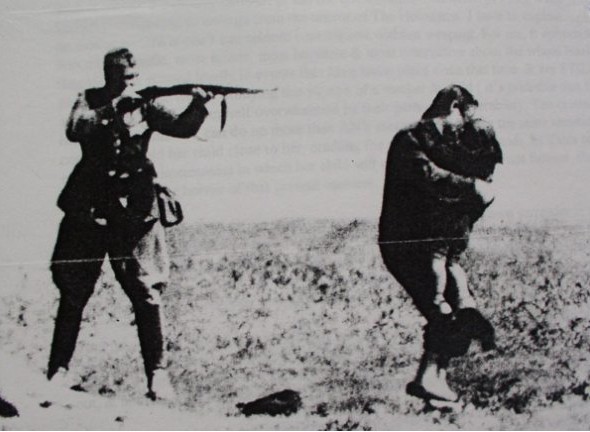 |
With the lives
of 6 million Jews on his hands,
Hitler of course is the most hated man of our time. That
said, people are surprised to find that Josef Stalin killed three
times as many people as Hitler. At 20 million some deaths, I
had always assumed Stalin was the league leader. However, when I
took a closer look, I found that the all-time champion is Mao Tse
Tung. Thanks in large part to his disastrous agricultural
experiments, China is estimated to have lost between 49 to 78
million people during Mao's reign of terror. (source)
So here is my
point. If monsters like Stalin, Hitler, and Mao can
murder people at the drop of the hat, it doesn't take much
of an imagination to believe certain American Psychopaths
could turn a blind eye to the suffering of our cancer victims.
So what would I
do if I received a diagnosis of cancer?
The one thing I
know I would do is AVOID our mainstream practice of chemo,
surgery and radiation.
During my
research, I ran across all
sorts of material that suggest our mainstream practice of
chemo, surgery, and radiation is just one step short of
barbaric. Since I am not a medical person, I cannot
speak to the truth of this assertion. So please don't
depend on me for any advice about treatment. However,
I don't mind sharing some of quotes I ran across.
"It is better not to apply any
treatment in cases of occult cancer; for if treated (by
surgery), the patients die quickly; but if not treated,
they hold out for a long time." - Hippocrates, (460-370
BC)
"After excision, even when a scar
has formed, nonetheless the cancer disease has returned, and
caused death; while ...the majority of patients,
although no violent measures are applied in the attempt
to remove the tumor, but only mild applications in order
to sooth it, attain a ripe old age in spite of it." - Celsus, (1st century AD)
"When [a tumor] is of long standing
and large, you should leave it alone. For myself have
never been able to cure any such, nor have I seen anyone
else succeed before me." – Abu’l Qasim, (936-1013 AD)
|
Wade Frazier:
I have a favorite quote that
is appropriate here, as it will apply to the medical
establishment in dozens of instances before this essay
is finished.
"There is a principle which is a bar against all
information, which is proof against all argument,
and which cannot fail to keep man in everlasting
ignorance. That principle is condemnation without
investigation."
-
Herbert Spencer
For instance, Hardin B. Jones, a
professor at the University of
California at Berkeley, studied 23
years worth of cancer mortality
statistics. His research was simple:
when was somebody diagnosed with
cancer, how long did they live after
diagnosis, and did they have
mainstream cancer treatment?
His
study was done in the 1950s and was
published in 1956. For treated
patients, their life expectancy
after diagnosis was three years, a
number that is about the same today.
Hardin Jones' study appeared to suggest that the
death rate for treated cancer patients and untreated
cancer patients was largely identical.
-
-
Wade Frazier,
The Medical Racket
|
 |
|
I would like to share a story written by Wade Frazier,
a man I admire very much. His web site,
A Healed
Planet, is the most profound website on the Internet I
have ever run across. I read with slack-jawed
amazement his stories about the
Savings
and Loan scandals of the Eighties. I found his
stories about conspiracies to halt
free
energy to be disturbingly believable.
And of course I
credit his article
The
Medical Racket for many of my own jaundiced views on the
Medical Industry. Here is a remarkable story from the
Medical Racket article.
Wade
Frazier, from
The
Medical Racket (Click the link and
search for the word "Holler".
It will take you right to this anecdote.)
"I
(Wade Frazier) have only met
one person who ever pursued an alternative cancer
treatment.
At age thirty-eight, in 1992,
Maria developed
an ovarian cyst and underwent surgery to remove it. When
Maria awoke from surgery, her doctor gave her the bad
news. While operating, he discovered ovarian cancer and
gave her a hysterectomy. He said that
Maria's only chance of
survival was beginning chemotherapy immediately.
My friend Maria is quite a woman. She escaped the Kentucky
holler where she was raised, got an education and became
the kind of schoolteacher that every student wants and
remembers. The woman is not possessed of a dazzling
intellect, something she readily admits, but she did
something unusual that not one person in a hundred (thousand?)
would have done in her position.
Maria knew nothing about alternatives.
She knew almost
nothing about cancer. However,
she vaguely remembered an
acquaintance who was seemingly cured of prostate cancer
by using an alternative method.
Her naïveté worked to
her advantage. She asked her doctor if he had ever cured
anybody of ovarian cancer. After beating around the
bush, he admitted that he had not. He said he had three
living patients, but that one would likely die soon. He
added that he had only been an oncologist for five
years, and did not have a record of accomplishment built
up yet. She then asked him then if his experienced
colleagues could give her the names of their surviving
patients. Her doctor said that he did not know anybody.
Maria called and talked to the Fred Hutchinson Research
Center (one of the most respected cancer clinics in the
world, here in Seattle, which has recently been the
center of scandal, because it performed involuntary
human experiments), the American Cancer Society, the
National Cancer Institute, various cancer treatment
centers in the United States, and cancer hotlines and
support groups. Her ear was red and sore from being on
the phone for about two weeks, calling all over America,
spending hours on hold.
Maria got copies of her slides and
medical reports, obtained as much literature as she
could find, and shopped for a doctor. She talked to her
acquaintance about his prostate cancer cure. He said his
doctor was Glenn Warner, and Dr. Warner cured him using
immunotherapy. Orthodox medicine repeatedly told her
that the survival rate for her cancer was about 10%.
Maria
was not encouraged.
Maria went to seven doctors, all orthodox oncologists
except Dr. Warner. She asked each doctor for the names
and phone numbers of surviving patients. To those
orthodox oncologists, giving references to patients was
beyond the pale of appropriate doctor-patient relations.
Only Dr. Warner consented to give her names of his
surviving patients (the others may not have had any, or
none that were willing to talk about their experiences
under that doctor's care). That was the main reason she
chose Dr. Warner. The other reason was that he treated
her the most kindly and personably of the seven doctors.
Maria and her husband radically changed their diets and
became vegans. Today her husband is a stricter vegan
than she is and runs marathons, and is in better
physical condition than anyone I know.
My friend
Maria underwent Dr. Warner's gentle treatment, fully
recovered from ovarian cancer and
began to look forward to
living to a ripe old age.
Unfortunately,
things took a bad turn for Dr.
Warner.
The
same year
Maria began treatment
with him, the witch hunt began. The medical authorities
swooped down on Dr. Warner, although practically
everything he was doing was mainstream treatment.
As
with other doctors who attract the medical inquisition’s
attention, Warner’s greatest defenders were his
patients, and my friend Maria was active in campaigning to
protect him.
It did not matter, however, and
they yanked Warner's license to practice medicine. Recently
the state also revoked the license of about the only other
alternative cancer treatment doctor in Washington, Dr. Bolles.
With the alternative doctors taken care of, the
only remaining
Seattle option is to go to mainstream oncologists who
will never give out the name of a patient who survived
their treatment.
|
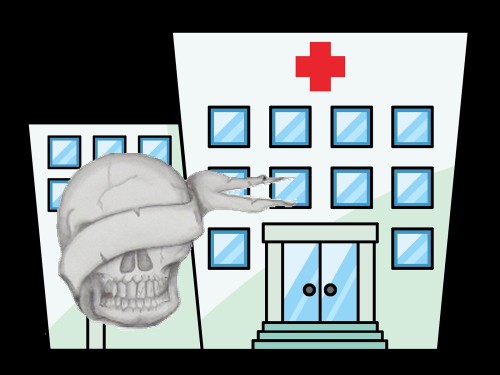 |
Dr. Warner died in 2001 at a ripe old age, and my friend
Maria attended his funeral. She considers Dr. Warner about the
kindest and most loving person she ever met, who also
possessed integrity of the highest order. At his
funeral, the church was packed to the rafters with
hundreds of people, coming to celebrate his life.
During the ceremony, somebody
stood up and asked if everybody who was a patient of Dr.
Warner would raise their hand, and most did. Then those
whose loved ones were treated by Dr. Warner were also
asked to raise their hand, and nearly every hand in the
church was raised. Probably no mainstream oncologist
ever had a funeral like that."
 |
Throughout my
Cancer Diaries, we have played a
game called "Let's Guess the Truth".
We know that
anyone can lie on the
Internet. That includes Wade Frazier and that includes
me.
I have said repeatedly that I have told the
truth, but that doesn't mean you have to believe me. I
could be the biggest liar of them all.
So at some point, people have to look to
their instincts. Does what Rick Archer
say make sense? Does Rick Archer support his
statements with sources? Does Rick
Archer seem to have anything to gain by
making these statements?
In other words, at some point we all have to
decide who we can trust and who we can't
trust.
So I have a
question for the reader.
Did Wade Frazier's story
about Dr. Warner sound like a scam to you?
Or did it sound on the level?
|
 |
Unfortunately, "Truth" can be a very elusive thing.
I have no possible way to verify Frazier's anecdote.
I have never met this man in my life. How am I
supposed to know if he is telling the truth?
It all boils down to what you wish to believe and where
you choose to put your faith.
As for me,
personally speaking, I thought Wade Frazier was telling a
true story... but I can't prove it nor will I try.
Here is my final
word on the subject of cancer.
Have you noticed
all the cancer commercials on TV? Maybe it is just the
channels I watch, but hospital after hospital is advertising
cancer care.
Cancer is Big
Business in America. Now that the Medical Conspiracy
has made sure to eliminate all competition, if we get sick,
then we have little choice but to turn to mainstream cancer
treatment. Good luck with that.
I firmly believe
that every day American cancer victims die right and left
because over time certain men with about as much compassion
as Josef Stalin have
systematically eliminated potential alternative cancer cures
and practitioners.
It is my
belief that all six alternative cures discussed in
my Cancer Diaries had the potential to cure cancer.
If these cures had been nurtured instead of
destroyed, I am certain at least one of them might
have solved our cancer dilemma long ago.
Trust
me, if alternative medicine had been allowed to
proceed, I would choose cancer-killing fruits,
coffee enemas and herbal tea over mainstream
medicine's cut, slash, and burn concept of cancer
treatment any day of the week.
But we
aren't given that choice, are we? Those
alternative methods were destroyed and now look what
we are stuck with.
Instead,
countless millions have gone to their death just to
make sure those hospital beds stay full and those
awful Big Pharma drugs keep selling. Meanwhile
the suffering continues.
To me,
the actions of these psychopaths fall just short of
deliberate genocide.
|
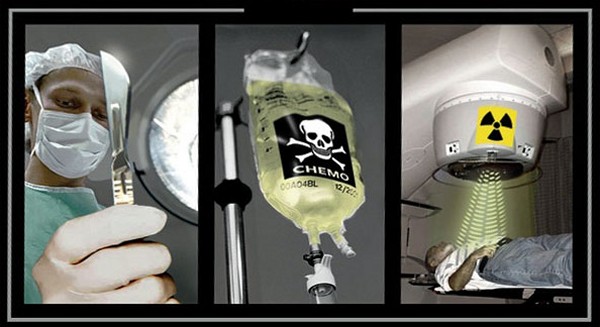 |
That realization
when coupled with the overall mediocrity of America's
healthcare system (Twisted
Golden Rule) has
left me completely disillusioned with our American medical
system.
Imagine how it
feels to know you could go bankrupt if you develop cancer in
this country and suffer horribly in the process. Then
for the exciting conclusion... you lay there dying while
your doctor explains how he has prolonged your life for 42
weeks using chemo, radiation, and surgery. Too bad you
were so nauseas from the chemo that you didn't get to enjoy
those precious final weeks. This frightening scenario could
happen to anyone. It is very upsetting.
In fact, I am so
profoundly disgusted that I have written nine chapters on
the subject in an
attempt to bring this situation to the attention of more
people.
Now
What Do We Do?
|
The big
question is how much patience do we have left with
mainstream medicine?
The official war against
polio was started in 1938. The war
against polio was
finally won in 1955.
Unfortunately, those fast results raised
everyone's expectations that cancer would succumb just as
quickly.
Although
medicine tried to find a cure for cancer throughout the
Twentieth Century, the signing of the National Cancer
Act of 1971 by President Richard Nixon is generally viewed
as the beginning of the official
war on cancer.
Now after
40 years of research involving many billions of
dollars, there is still no sign that this war is going to
end any time soon.
This lengthy period without
any obvious progress has led many
to lose hope that cancer will ever be cured in their
lifetime.
Meanwhile the cancer
statistics have grown to such an alarming degree that many
people now refer to cancer as an ‘epidemic’. The ominous
trend in the statistics is alarming.
•
At the start of the
Twentieth Century, one person in 20 got cancer.
•
By 1940, that ratio had
changed to one in 16.
•
By 1970,
the start of
Nixon’s War on Cancer, it was one in 10.
•
By 2000, one in three people
were likely to develop cancer in their lifetime.
•
By 2010, one in two men and one in
three women will get cancer in their lifetime.
•
In 2014, there
will be an estimated 1,665,540 new cancer cases diagnosed
and 585,720 cancer deaths in the U.S.
•
Cancer is the
second most common cause of death in the US, accounting for
1 of every 4 deaths.
Take
another look at those numbers. Half a million
Americans die of cancer each year. One million new
Americans can expect to be diagnosed with cancer each year.
With numbers like these, it doesn't take
much of an imagination to see we
have a growing epidemic on our hands.
The physicians will say this is
because we are all living longer and cancer seems to
automatically kick in at some particular age the same way
cars are rumored to be programmed to fail at a certain
mileage.
I cannot help but wonder if this age
excuse is a
smokescreen for the truth.
Another equally
valid explanation might be the environmental problems across
the country such as pollutants in our air, chemicals in our
water, chemicals in our land, and toxins in our food
supply.
People will naturally ask me the
question, "Well, Rick, what would you do about this
problem?"
I say we need to unite. We need
to make as many Americans aware of the Medical Conspiracy as
possible.
Jeff Wigand said that he no longer
lives in fear because he has so many people backing him.
There is strength in numbers.
Most of all, we need to identify a
leader, be it a media person, medical person, or politician.
We need to find someone
who is willing to harness the outrage that Americans feel
toward the corruption in the American medical system. And then we need to empower this
person with our support.
If we shine enough light on this
problem, I think we can kill the Cancer Hydra Monster the
same way that Jeff Wigand killed the Tobacco Dragon.
Rick Archer
November 2014
Rick@ssqq.com
Rick's Note:
I am not a Democrat nor am I a Republican. I am an
American citizen who wishes to speak up. And thank goodness
I live in America, the greatest country in the world, a land that allows me
this freedom.
|
Rick Archer's Note: Study after study
confirms the USA has one
of the most miserable health systems in the world.
Yes, it is true that if you are rich, you can get excellent
health care in America. But how many of us are rich?
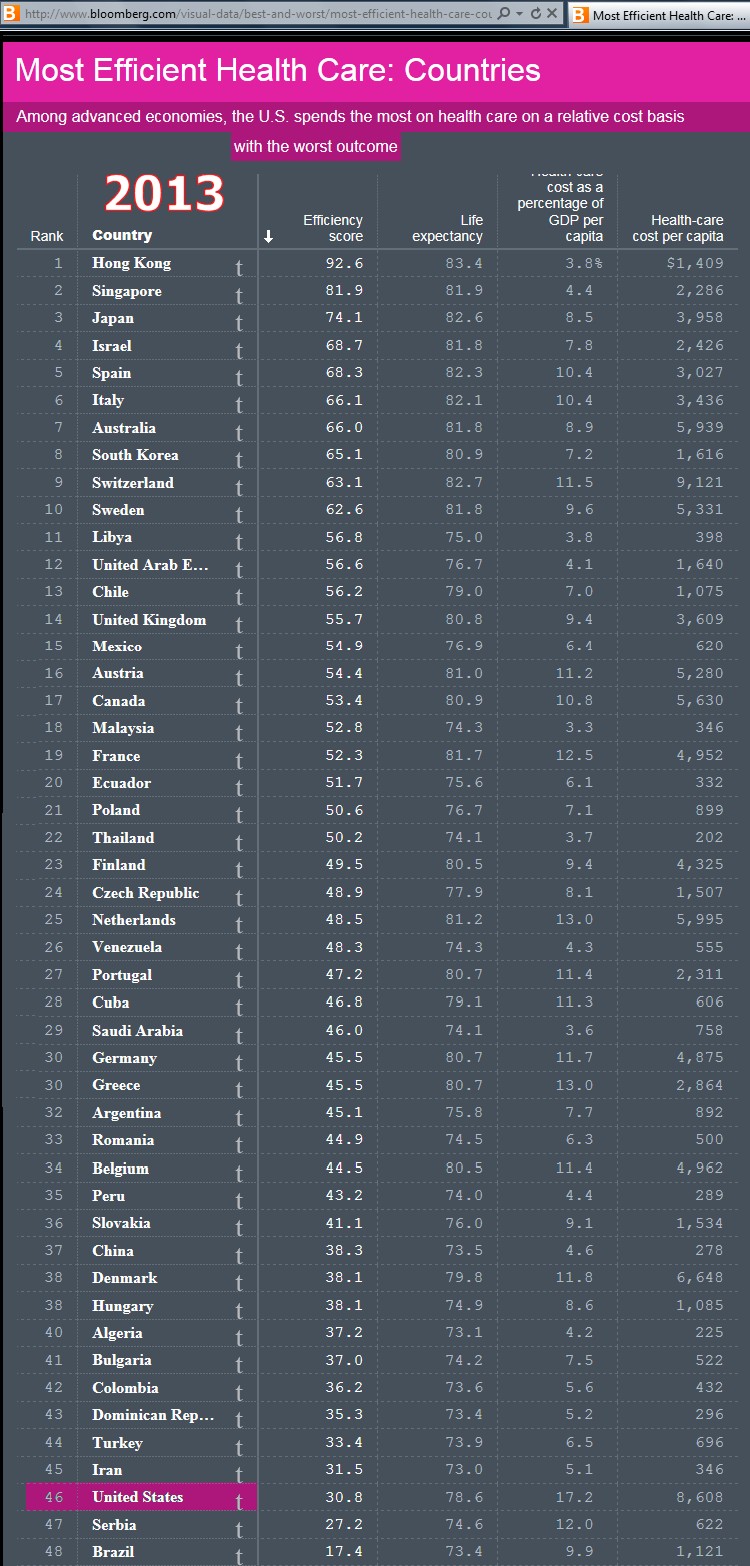
According to this chart, only one country
in the world pays more per person than the USA. That
would be Switzerland. Before you feel too sorry for
Switzerland, this country is rated as one of the Top Ten
best health care systems in the world.
In the
USA, we
pay $8,608 per person. According to this chart, you could go
to Iran and get better treatment for $346.
17% of
our earnings go to medical care. No other nation is
even close!
It is
absurd to think how much we pay and how little we get in
return.
That
"$8,608 per person" is a legitimate statistic. At age
64, I pay $830 a month in insurance. That means I pay
close to $10,000 a year up front. That is a stiff
price for a person like me who is retired. THEN there
is the $2,500 deductible....
What
is darkly fascinating is that America is clearly slipping in
the rankings. In 2006, the USA was #37. Now we
are #46! All that hype about America with its finest
doctors, the finest hospitals, the greatest medical
schools... well, some of it may be true... but our actual
national system of medical delivery to the citizens is
completely and totally broken.
|
|
| |
|
The
origin of all revolutions and corruption, and the spur
and source of all base morals are just two sayings:
The First Saying: 'So long as I'm full, what is it to me
if others die of hunger?'
The Second Saying: 'You suffer hardship so that I can
live in ease; you work so that I can eat.'
- Said Nursi
|
The
fight for justice against corruption is never easy.
It never has been and never will be. It exacts a
toll on our self, our families, our friends, and
especially our children. In the end, I believe, as
in my case, the price we pay is well worth holding on to
our dignity.
- Frank Serpico
|
In
1927, Justice Louis Brandeis wrote:
Men
once feared witches and burnt women. It is the function
of speech to free men from the bondage of irrational
fears. The freedom to think as you will and to
speak as you think are means indispensable to the
discovery and spread of political truth.
|
If
large numbers of people believe in freedom of speech,
there will be freedom of speech, even if the law forbids
it.
But if
public opinion is sluggish, inconvenient minorities will
be persecuted, even if laws exist to protect them.
- George Orwell,
author of '1984' and 'Animal Farm'
|
“Of
course the people don't want war. But after all, it’s
the leaders of the country who determine the policy, and
it’s always a simple matter to drag the people along
whether it’s a democracy, a fascist dictatorship, or a
parliament, or a communist dictatorship.
Voice
or no voice, the people can always be brought to the
bidding of the leaders.
That
is easy. All you have to do is tell them they are being
attacked, and denounce the pacifists for lack of
patriotism, and exposing the country to greater danger.”
-
Herman Goering at the Nuremberg trials.
|
The
biomedical and pharmaceutical companies essentially own
the FDA. It is a classic case of capturing the
regulator, transforming a public watchdog into an
industrial attack dog.
Consequently, the FDA’s general philosophy is protecting
and promoting drugs and other lucrative products sold by
its rich patrons, and wiping out natural remedies and
other inexpensive health solutions.
Under
the FDA's ministrations, natural remedies, health
supplements and their practitioners are wiped out,
replaced by lucrative artificial "medicines."
The
FDA has been trying to regulate vitamins and herbs for
many years. Every time they try it, there is public
outcry, senators and congressional representatives feel
the heat from their constituents, and the FDA is beaten
back.
They
are not thwarted for long, however, as health
supplements can be a lucrative business, once they
become classified as drugs and can only be made by drug
companies, sold only with a doctor's prescription. That
might seem extreme, but it accurately describes what the
FDA has been doing for generations.
- Edward Griffin
|
The
outcries against any proposed new cancer laws will be
loud, emotional and designed to distract attention from
the real questions and legitimate health concerns.
The
behind-the-scenes actions by the Medical Monopolists
will be cold, calculating and brutal.
Too
much money is at stake to imagine that this conflict
will be anything but bloody, with good and evil having a
monumental showdown before it is over.
- Barry Lynes
|
It
is difficult to get a man to
understand something when his income
depends on his not understanding it.
– Upton
Sinclair
|
The Hippocratic Oath is
an oath historically
taken by physicians and
other healthcare
professionals swearing
to practice medicine
honestly.
It requires a new
physician to swear upon
a number of healing gods
that he will uphold a
number of professional
ethical standards and
act at all times in a
beneficial, healing
manner towards his
patients.
The Hippocratic Oath
speaks to the sanctity
of human life.
Today many doctors
kowtow to the same
failed cancer treatments
such as chemotherapy,
surgery, and radiation
that they know full well
will create great
suffering while offering
little chance at any
lasting cure.
One can only wonder when
the Hippocratic Oath
became the Hypocritical
Oath. .
– Rick Archer
|
|
|